Final report March 2025
TheFutureofTravelinBlaenau Gwent-aCitizens’Forum

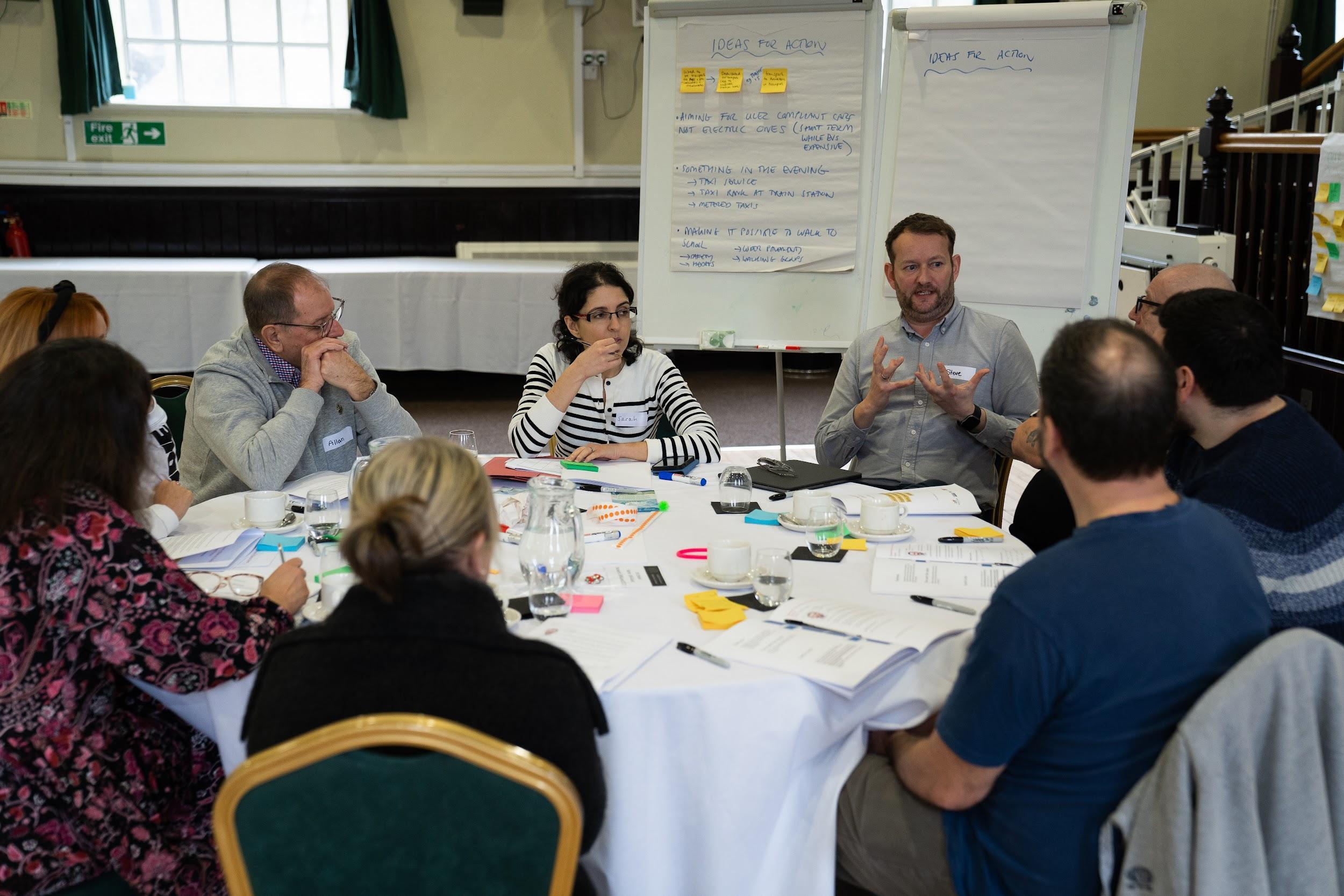
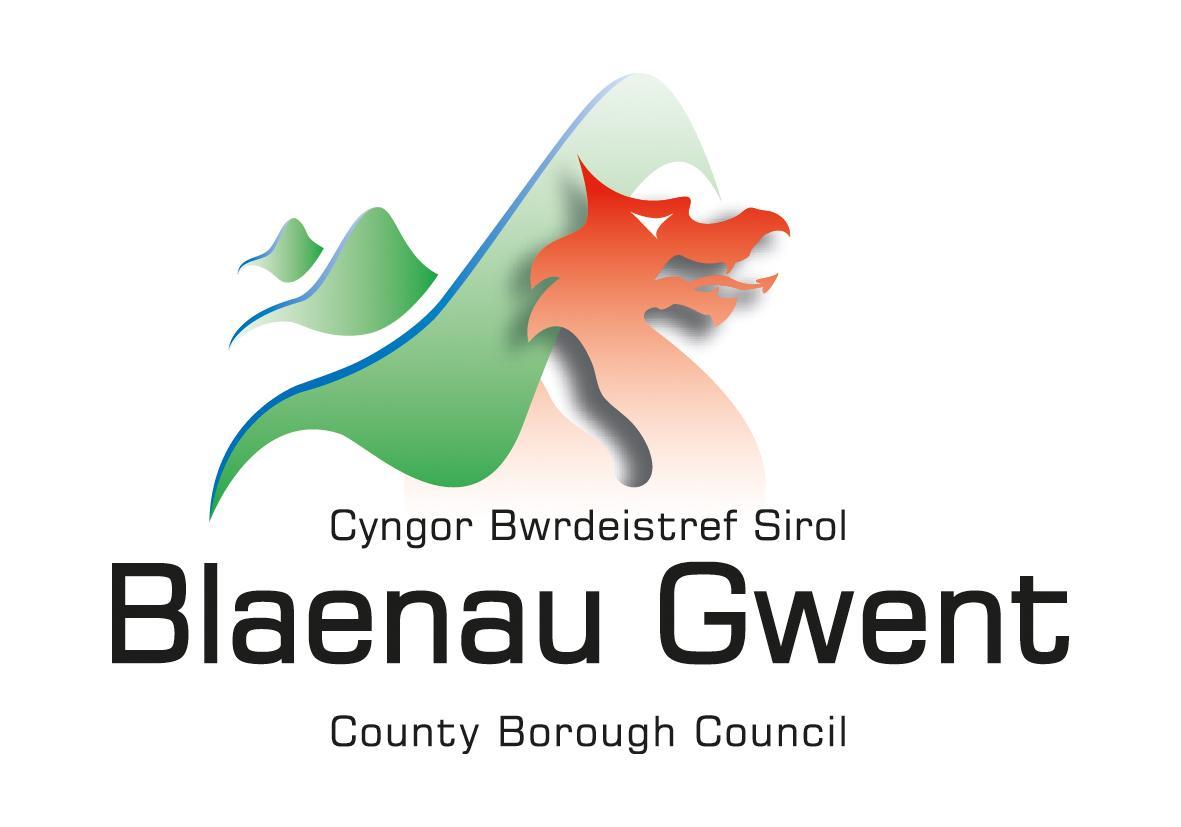
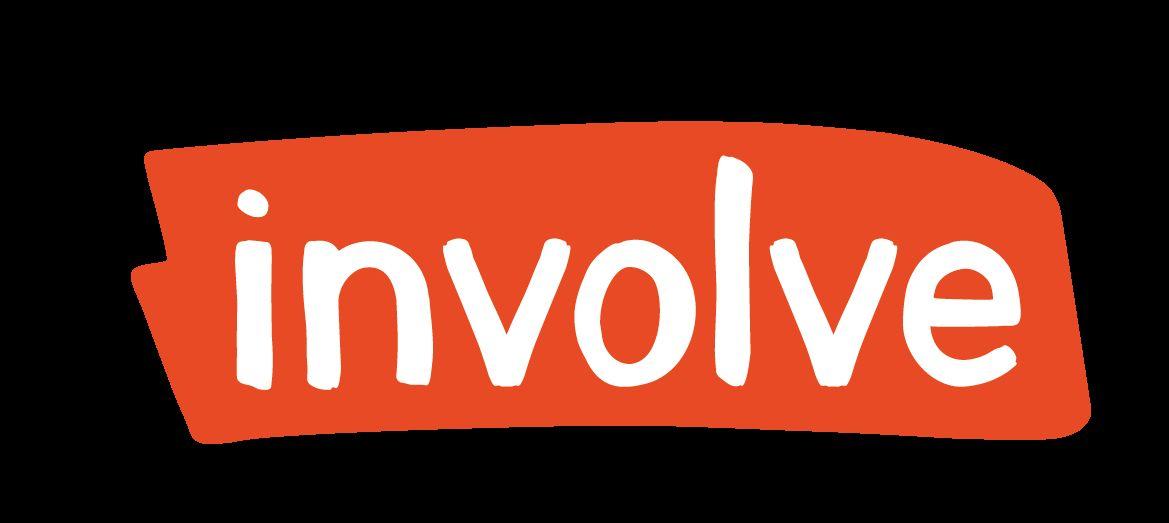
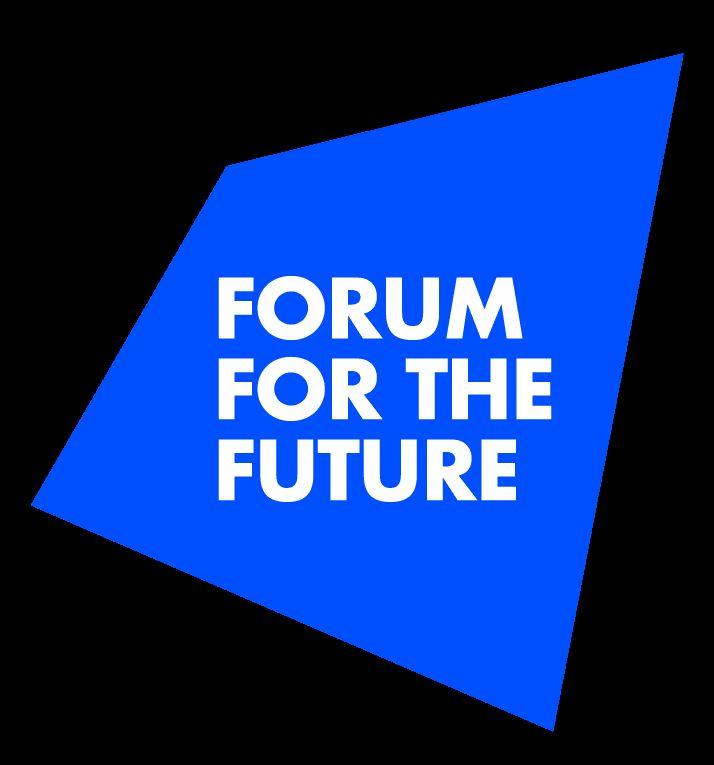
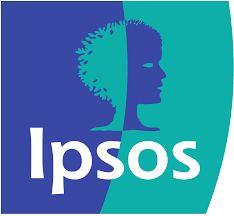

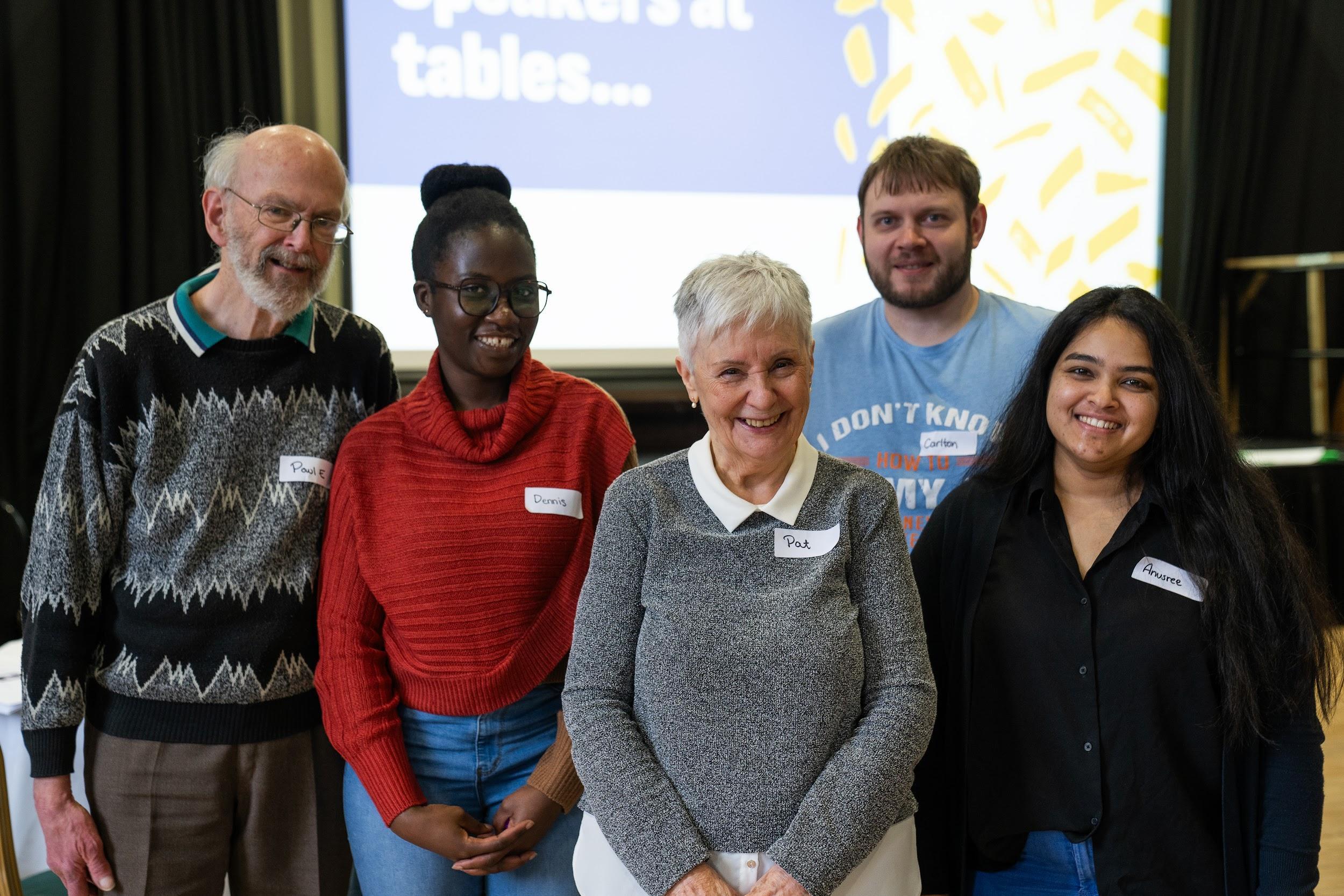
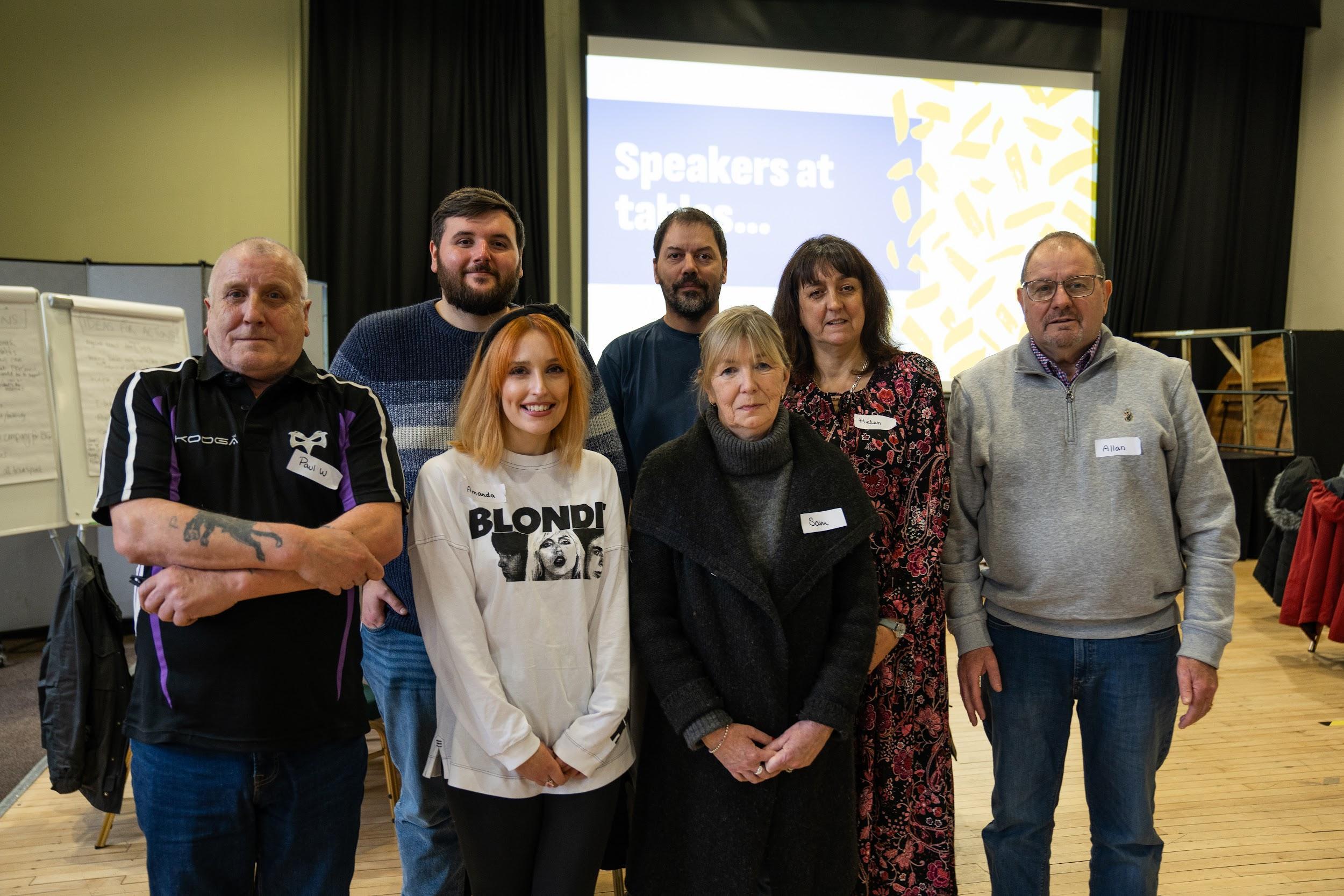



Withthanks
With thanks to the 19 forum members who contributed their time, energy and ideas to the citizens’ forum: Allan, Amanda, Anusree, Carlton, Daisy, Darren, Helen, Jason, Lyn, Maysell, Nick, Patricia, Paul E, Paul W, Robert, Sam, Shannon, Shirley, and Stephen
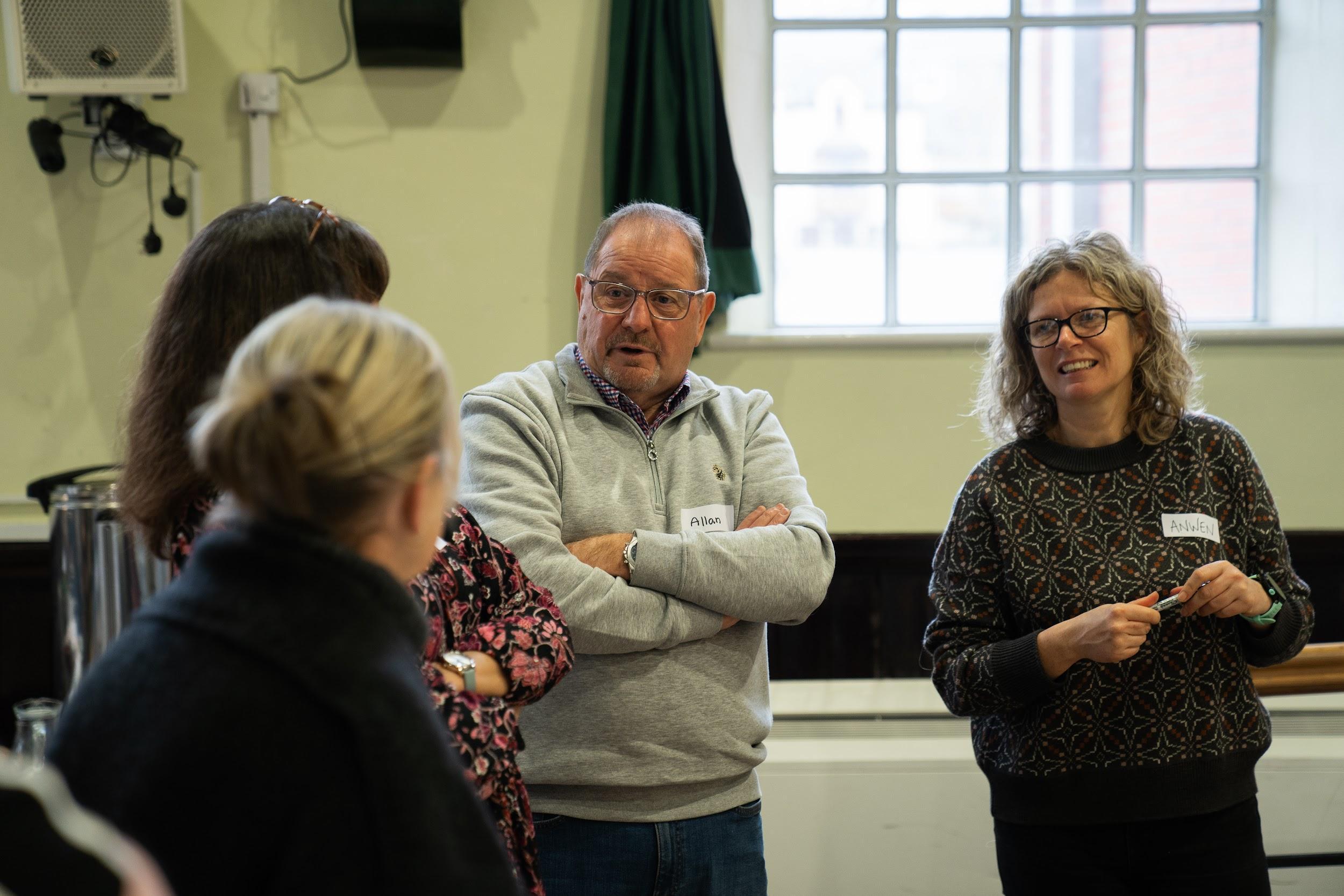
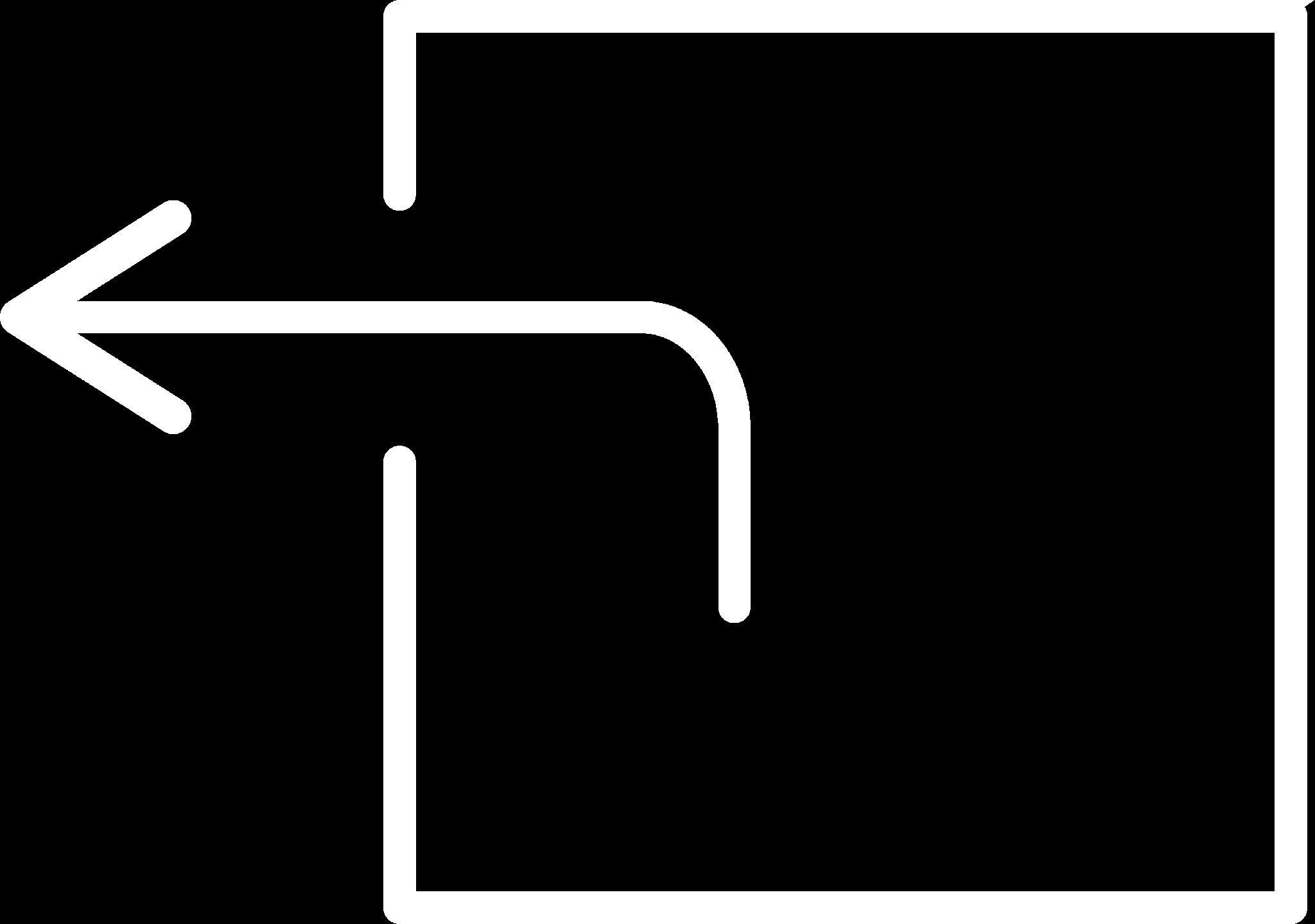

ExecutiveSummary
Current travel options in Blaenau Gwent are not always fair, reliable, or accessible for everyone. And in the coming years, residents will need to change how they get around in response to climate change. To meet both these challenges, Blaenau Gwent Council are developing a strategy for the future of travel for the local area.
As part of Innovate UK’s Net Zero Living programme, the council worked with Involve (who wrote this report), Forum for the Future, Ipsos, and Quantum to run a citizen’s forum on the future of travel in Blaenau Gwent. The aim was to put citizen ambitions for the future of their area at the heart of the council’s travel strategy.
The process brought together 19 residents, broadly reflective of Blaenau Gwent across different demographics (see Who took part?).
Through three in-person sessions, the group learnt about travel from a range of speakers. Topics included climate change and options for better ways to travel. They heard about the challenges Blaenau Gwent council is facing, discussed potential solutions and thought about their own experiences of travelling locally.
The forum used their learning to write recommendations for Blaenau Gwent council, based on what would be achievable in the next 5 years. They developed:
● a vision for fairer, greener and better travel
● recommendations for how to get there
● guidelines for how to achieve this in a fair way.
All of these are included in the forum’s own words in this report. In response to the forum’s recommendations, the council will:
● present the forum’s report and recommendations to elected members for endorsement and adoption
● publish and share this report and the recommendations on the council website and wider community
● publish a formal response to all recommendations, including responses from other partners who will deliver some of this work
● where they are unable to take any recommendations forward, set out why and suggest alternatives.


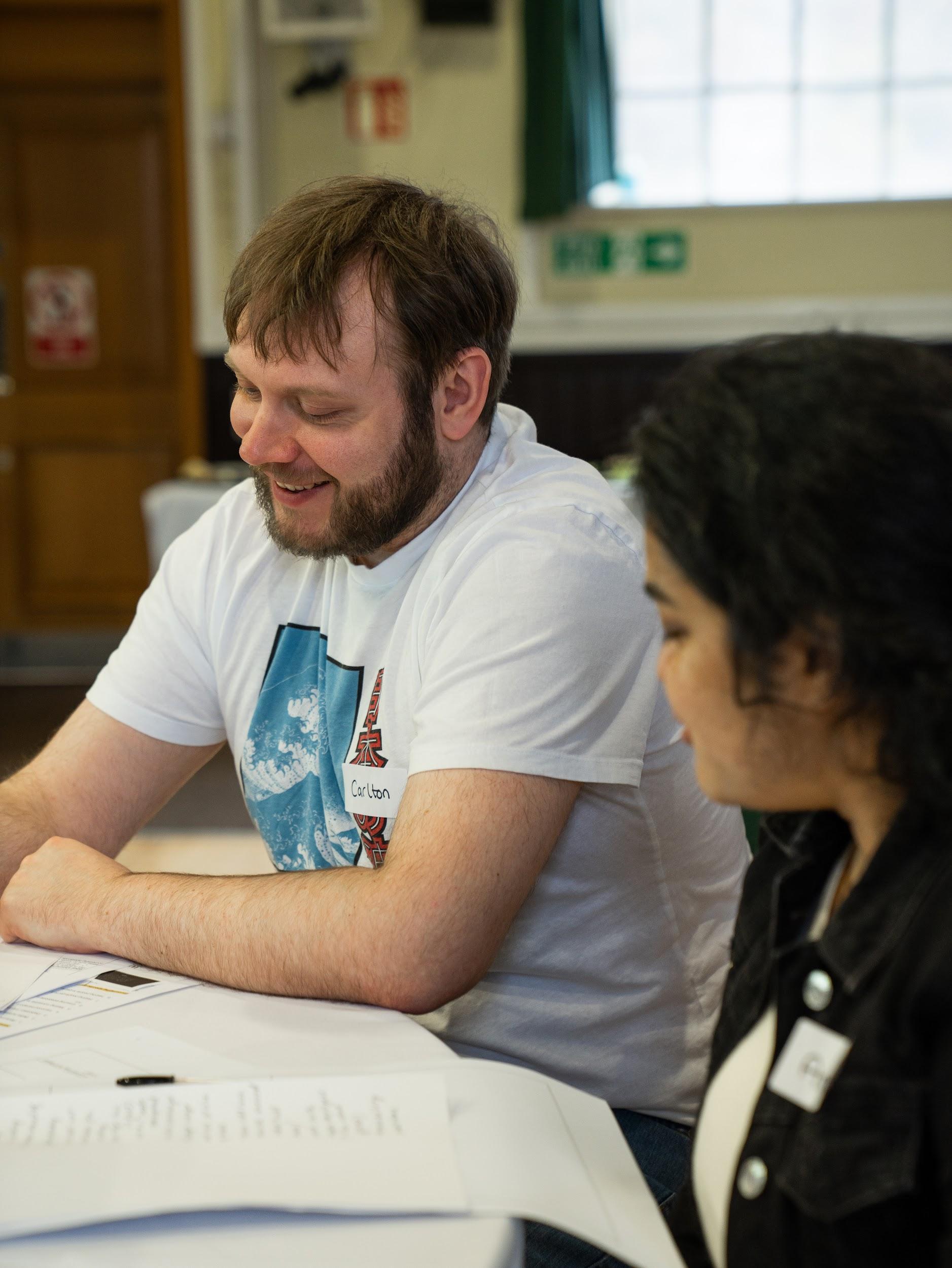

Background
Projectorigins
Why the future of travel?
Changing how we get around is a major part of tackling the climate emergency. At the same time, our network and options for travel need to improve to meet communities’ needs - particularly in rural areas like in Blaenau Gwent.
In 2021, Blaenau Gwent ran a local climate assembly. The citizens who took part recommended a more integrated transport system and improvements to walking and cycling options. Blaenau Gwent Council are now working towards overcoming barriers to a net zero transport system and would like to understand more about the climate assembly’s previous recommendation.
This project came at a good time to influence the council’s vision for the future local transport system, and to shape the council’s contributions to a regional transport plan for Southeast Wales.
Why a citizen visioning forum?
Citizen visioning builds upon community knowledge and is rooted in the local context. It meets people where they are, identifying barriers and building on their community’s unique strengths. At the same time, people are invited to step back, to look at the bigger picture and into the future.
The forum in Blaenau Gwent used this approach to create a positive vision for travel and practical steps to make that vision a reality.
What question did this process set out to answer?
The forum were asked to respond to the question:
How can Blaenau Gwent come together to make local travel fairer, greener and better for everyone?
The citizens’ forum worked together, deliberated and agreed upon:
● a vision for fairer, greener and better travel

● a set of recommendations for how to get there
● guidelines for how to achieve this in a fair way.

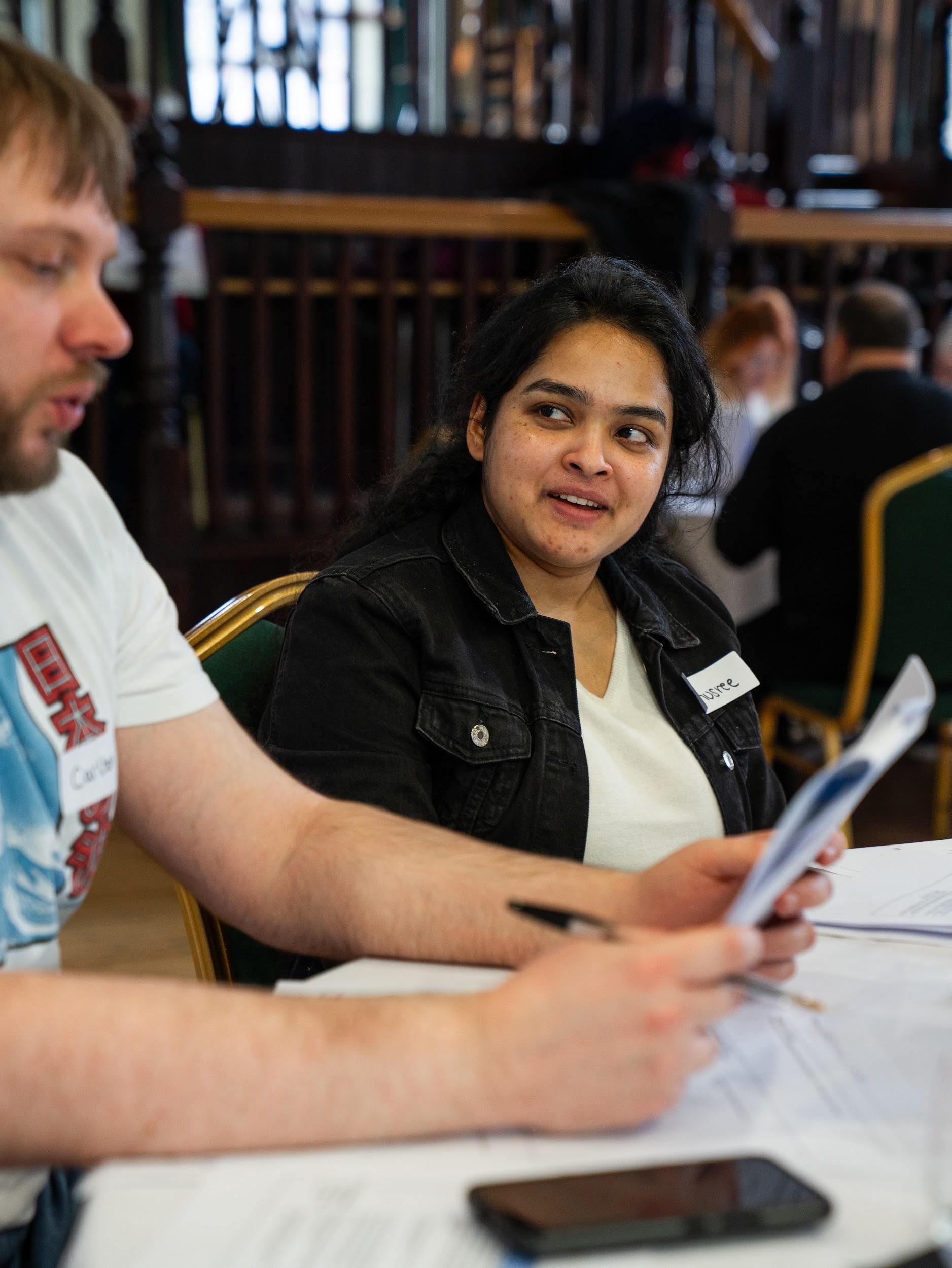
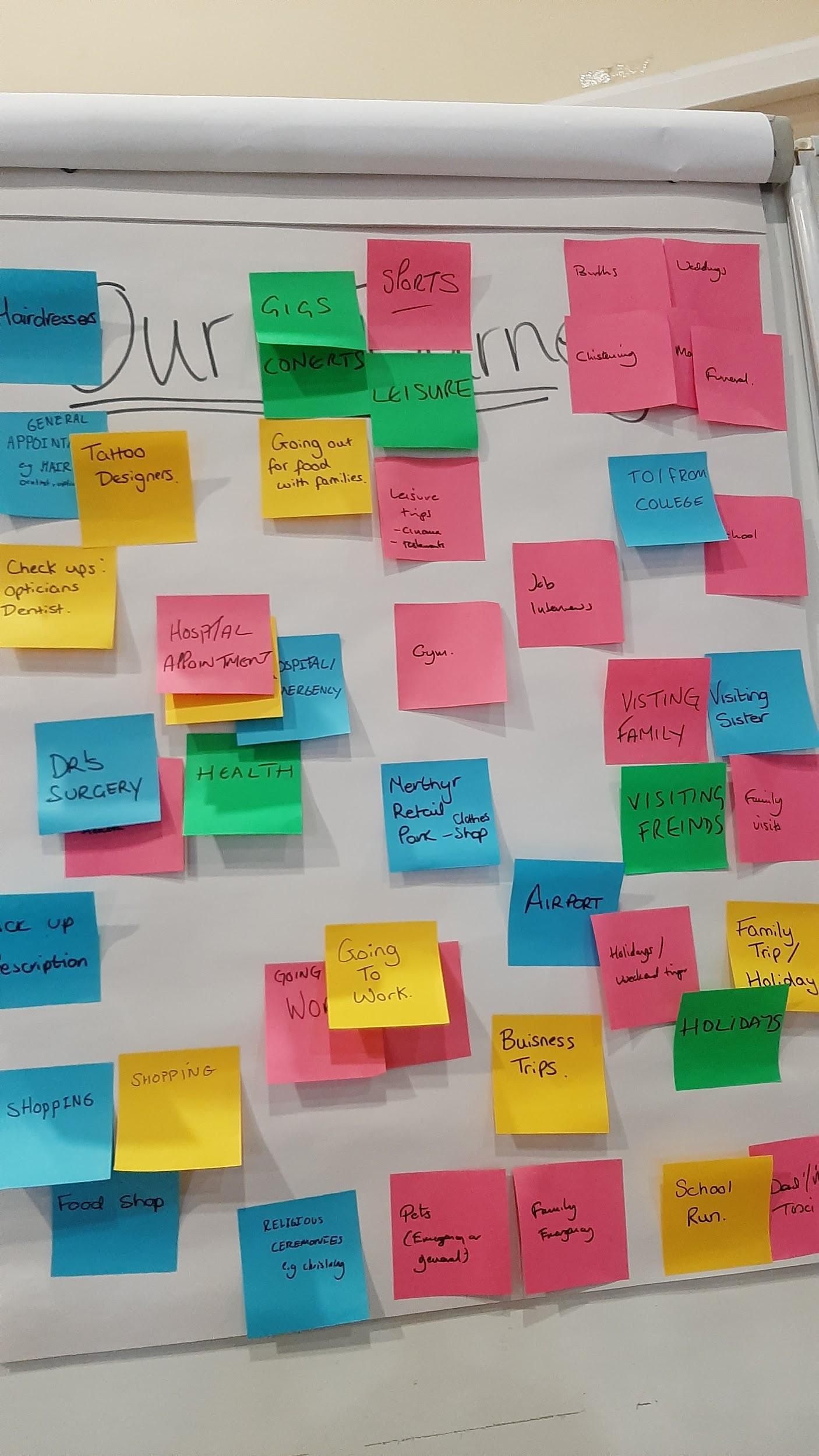

Thequestion
How can Blaenau Gwent come together to make local travel fairer, greener and better for everyone?



OverviewofCitizenVisioning
Learning Deliberation Decisionmaking
Participants learnt about the topic from a range of speakers, including those they requested themselves. Topics covered an introduction to climate change, local impacts and solutions.
Participants discussed the information they had heard and developed a long list of ideas, weighing up potential ways forward. The council reviewed these and provided feedback.
Participants worked together to review feedback from the council and agree on:
● A final vision
● A set of priority recommendations
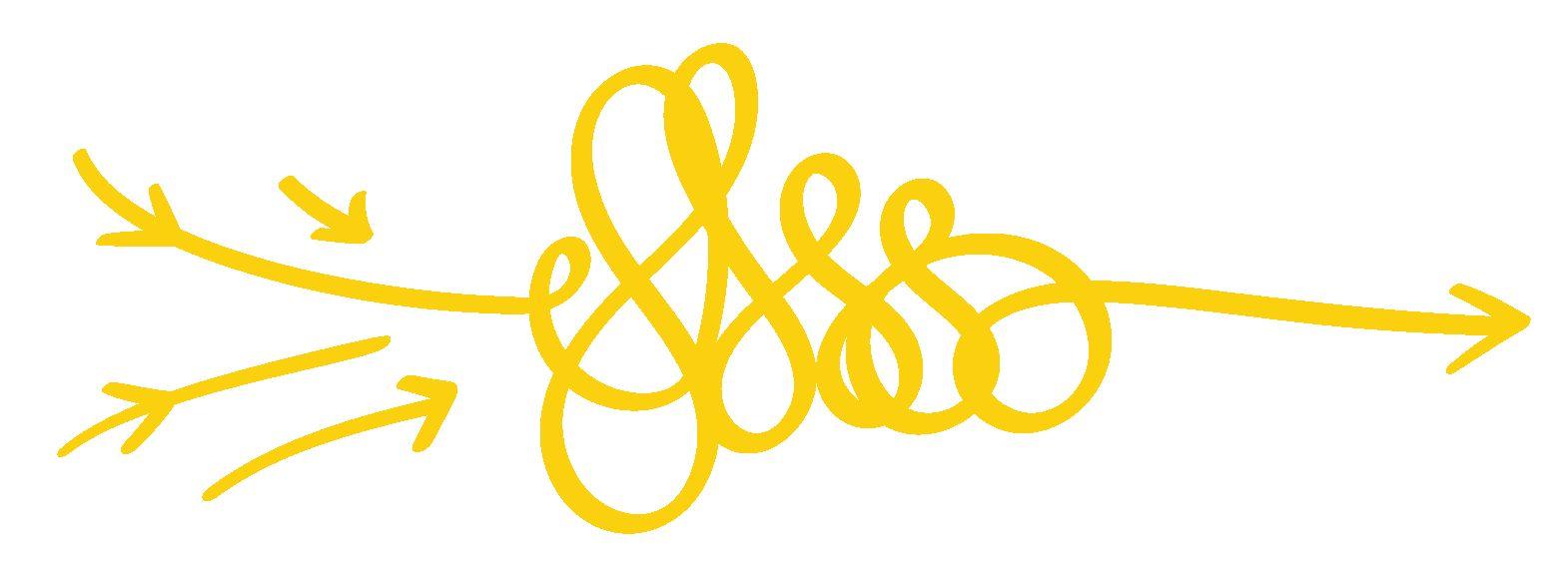
● Guidelines for how to achieve this in a fair way.

Whatwedid
Forum members met at three one-day sessions in early 2025.
Day One: The forum began with a welcome session and agreeing group guidelines for how they wanted to work together.
Speakers presented about climate change, how it relates to travel, what is within local control, and other benefits to health, the economy and communities. Forum members asked questions to all of the speakers.
Alongside this, forum members reflected on their own experiences and what they liked and disliked about travelling in Blaenau Gwent currently.
Forum members then used their experience and knowledge to create a vision for what local travel in Blaenau Gwent should look like in future.
They then spent some time discussing how local travel could be made fairer for all.
Day Two: Two weeks later, forum members met again to learn more and start developing ideas for the future.
They talked about common journeys taken and why they used or didn’t use certain travel methods. You can read what journeys they take, how, and what they like or dislike in Appendixes 1-3. They heard from speakers about ideas for better travel, including active travel, car sharing, low emission vehicles, public transport, and community transport.
The forum drafted a list of potential recommendations for the council and other partners to do. Involve shared this list with an advisory group of local actors and the council to make sure that the recommendations could be taken forward at a local level within the next five years. You can find this in Appendix 4.
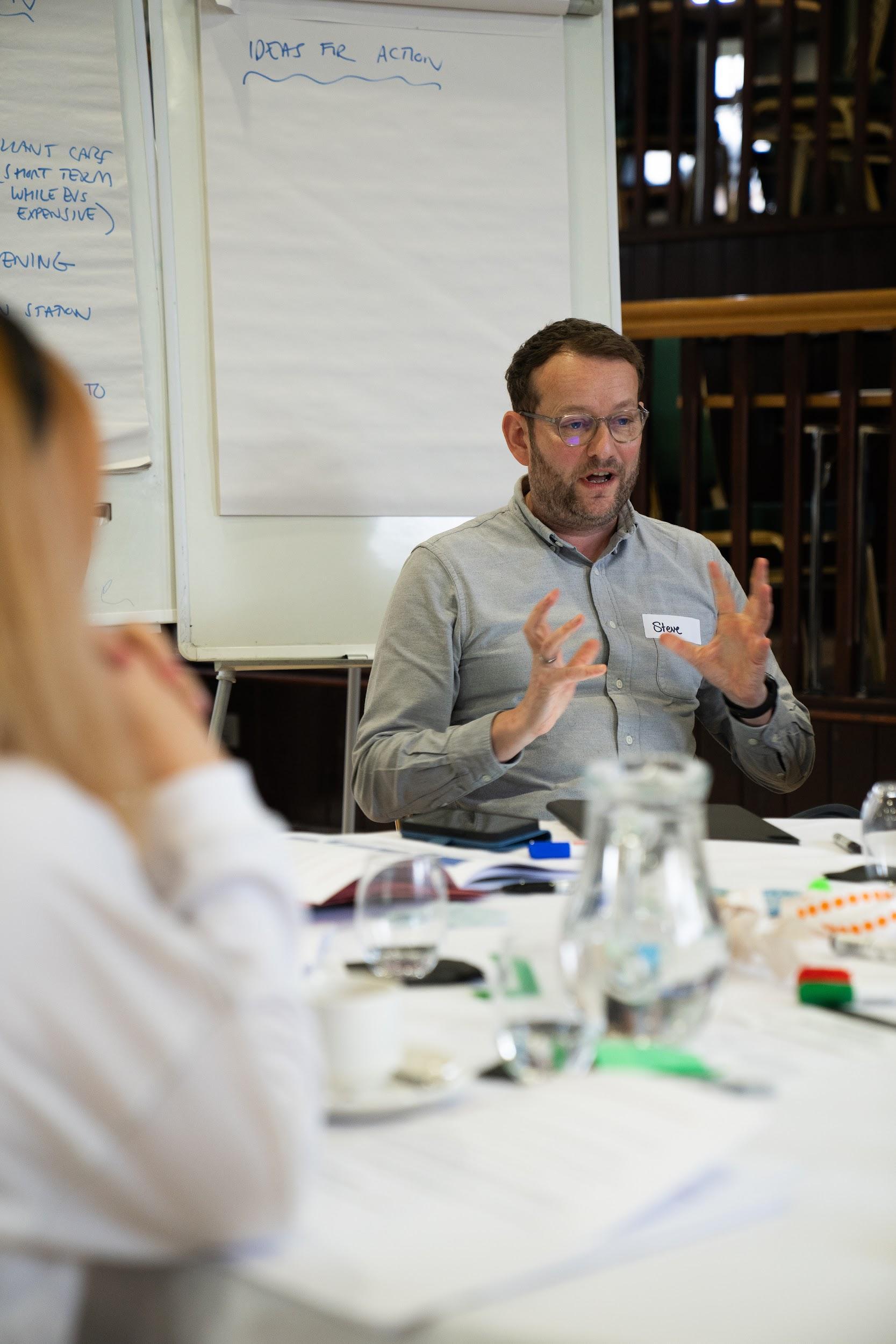
.
Whatwedid
Day Three: At the final session, the forum
finalised their recommendations and guidelines.
They took their previous drafts and decided which were most important in a vote. You can see the votes in Appendix 6. The forum members developed their ideas in small groups, with explanations of why they were important and the practical steps needed to achieve the ideas.
Forum members gave one another advice on how to make the recommendations even stronger, to create the final set of ten recommendations for action.
Finally, members reviewed their ideas around fairness, and agreed a set of guidelines for how the changes to travel could be fair.
Thankyoutoourspeakers:
● Chris Blake, Director, The Green Valleys
● Owen Ashton, Blaenau Gwent Council
● Sarah Williams, Blaenau Gwent Council
● Daniel Wheelock, Blaenau Gwent Council
● Councillor Helen Cunningham
● Steve Brooks, National Infrastructure Commission for Wales
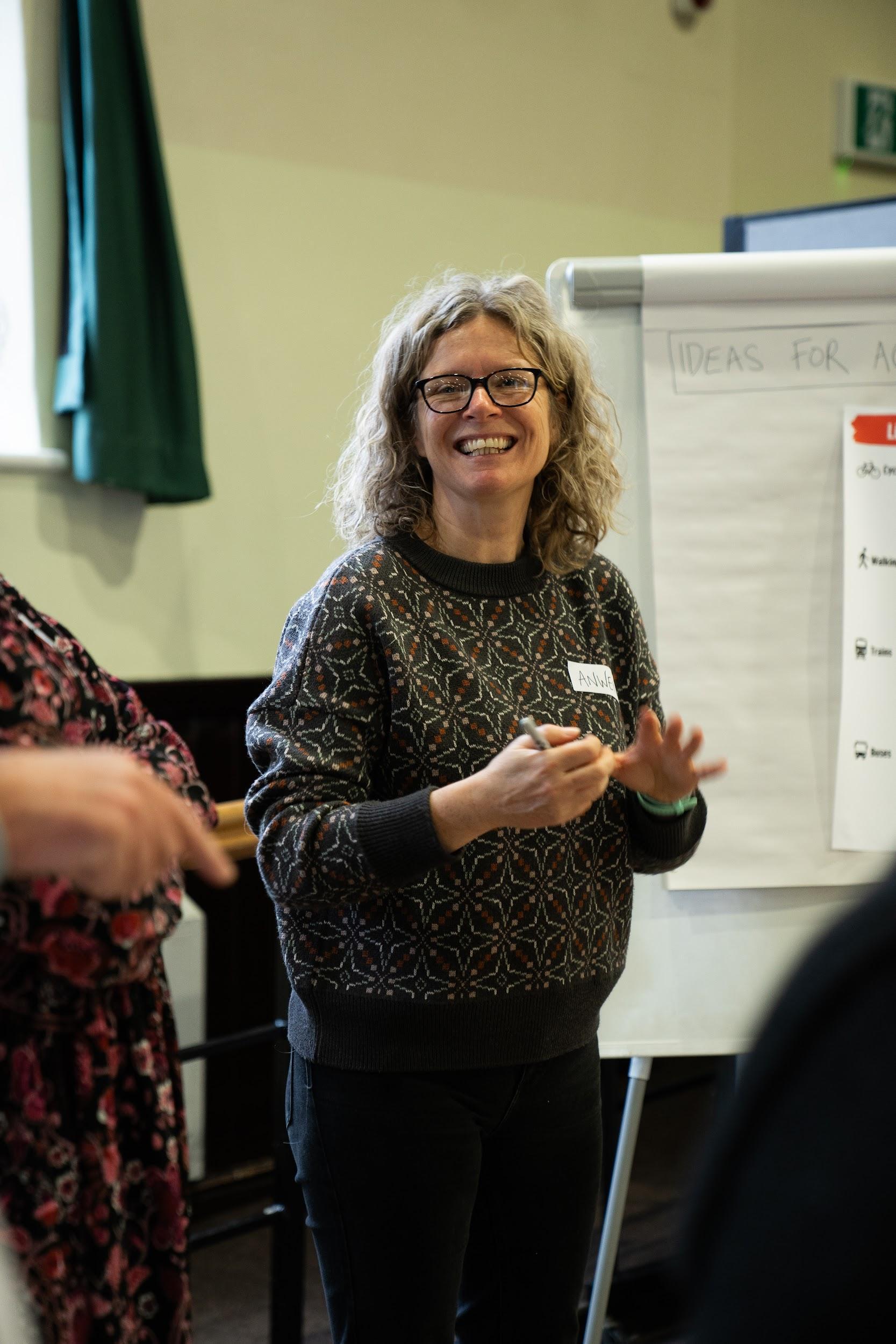
● Mike Logan, Bridges Centre
● Jessica Norris, Blaenau Gwent Council


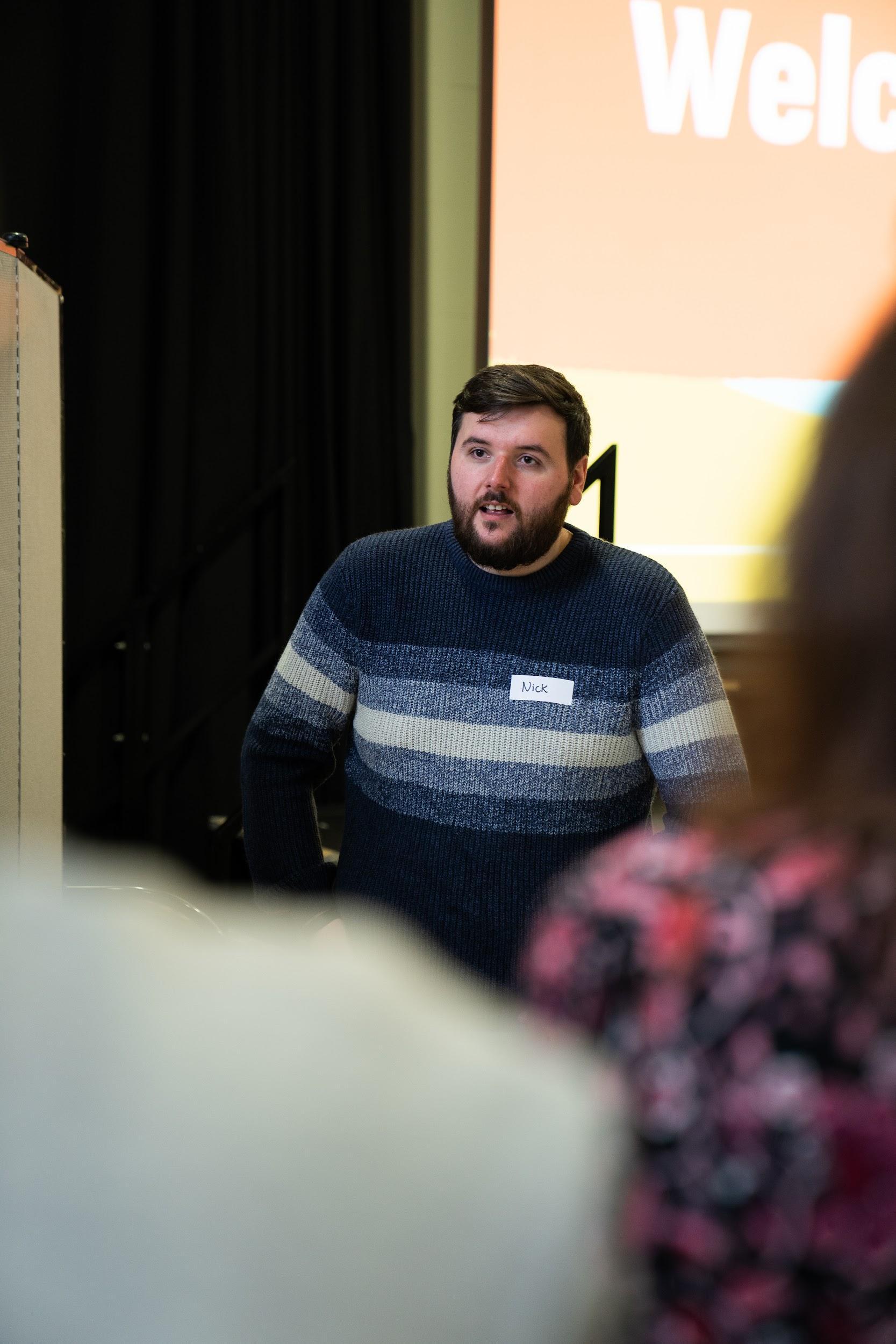

Whotookpart?

Whotookpart?
In total, 19 people were recruited to broadly reflect the population of Blaenau Gwent.
We sent letters inviting people to take part to 6,500 randomly selected residential addresses across the whole of Blaenau Gwent. We selected citizens’ forum members from those who had received a letter and then signed up.
We gave members of the group a gift of thanks for taking part in all sessions, to make participation accessible to all and in recognition of their time. We also covered travel and any additional costs such as childcare.
Howwereparticipantsselected?
Our partners the Sortition Foundation selected forum members were selected using a type of civic lottery called sortition.
Residents completed a form to express their interest in taking part. From there, we removed personal details and selected a group using a computer program to be broadly reflective of the area in in terms of their:
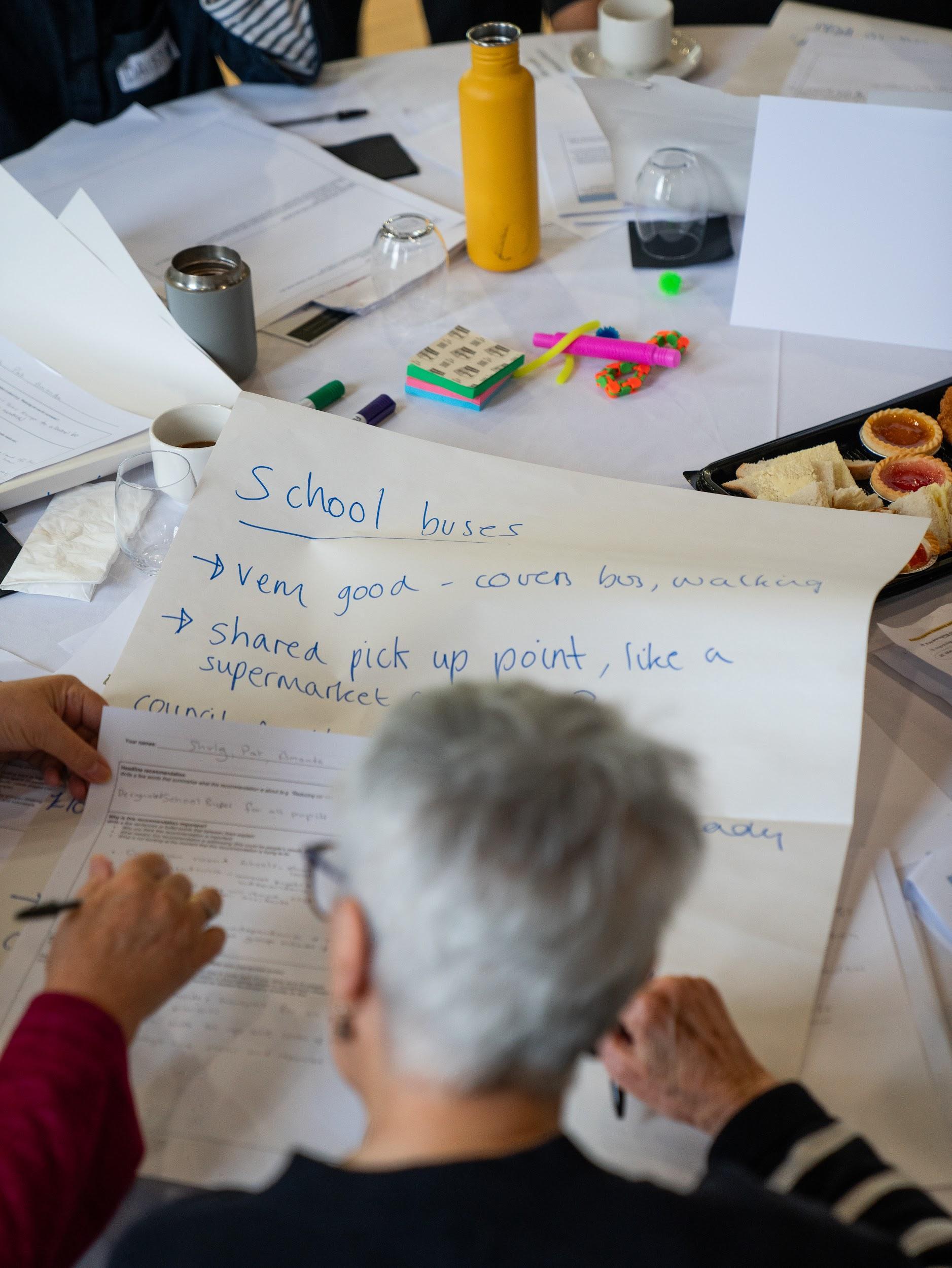
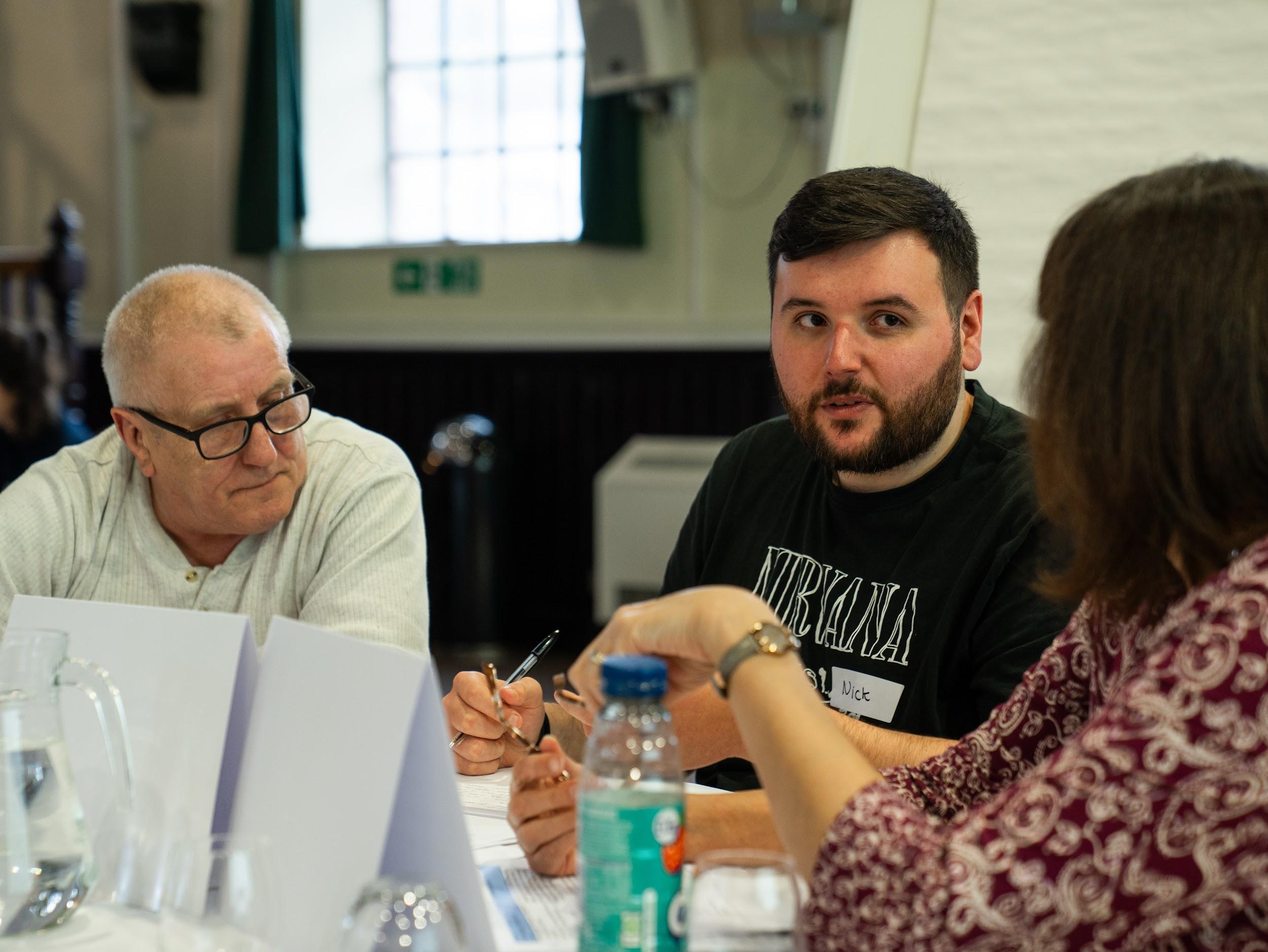

Makeupofthegroupataglance
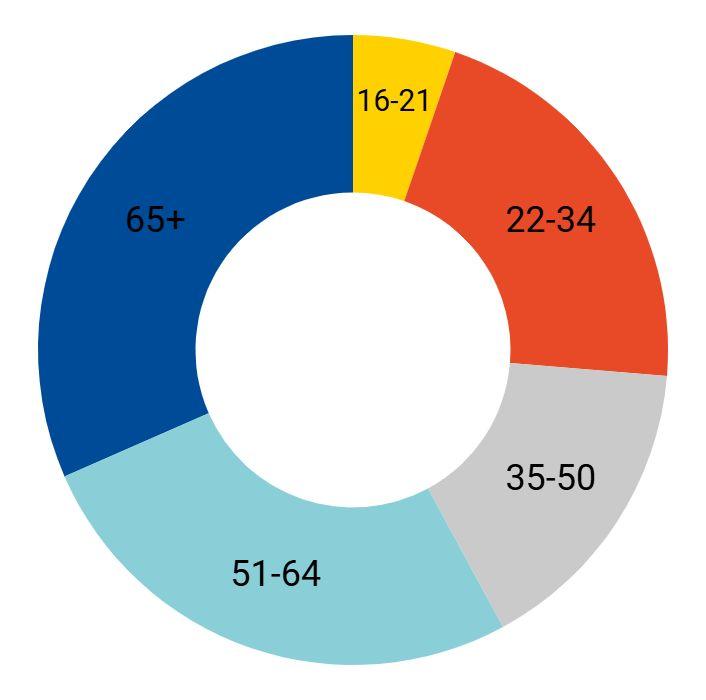
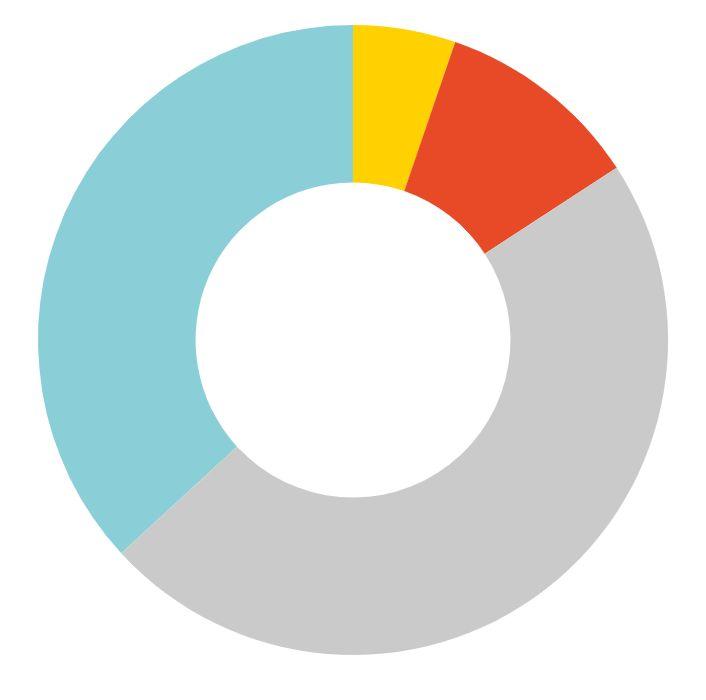

*Measure ranked on average travel time to range of services for all people in Wales. 1% represents the longest journey, 100% the shortest journey. Divided into three groups 1-20%, 21-50% and 51-100%.
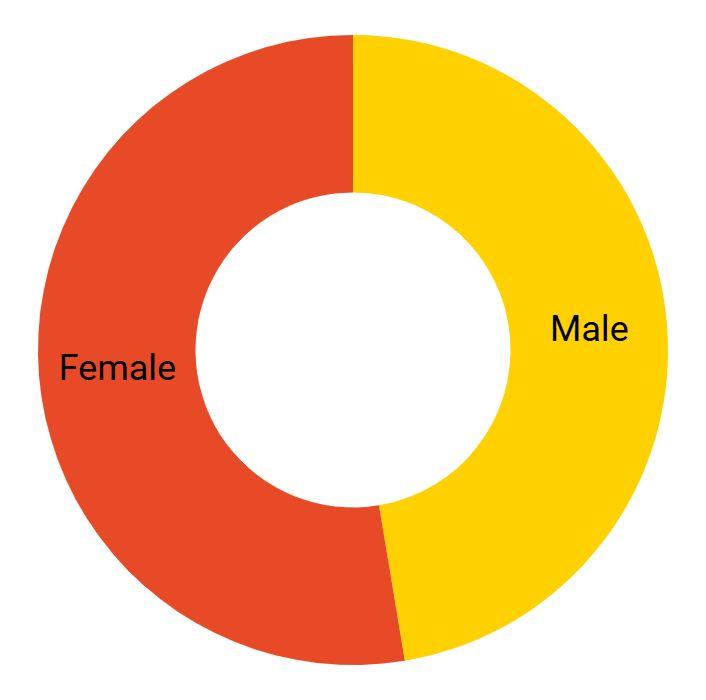
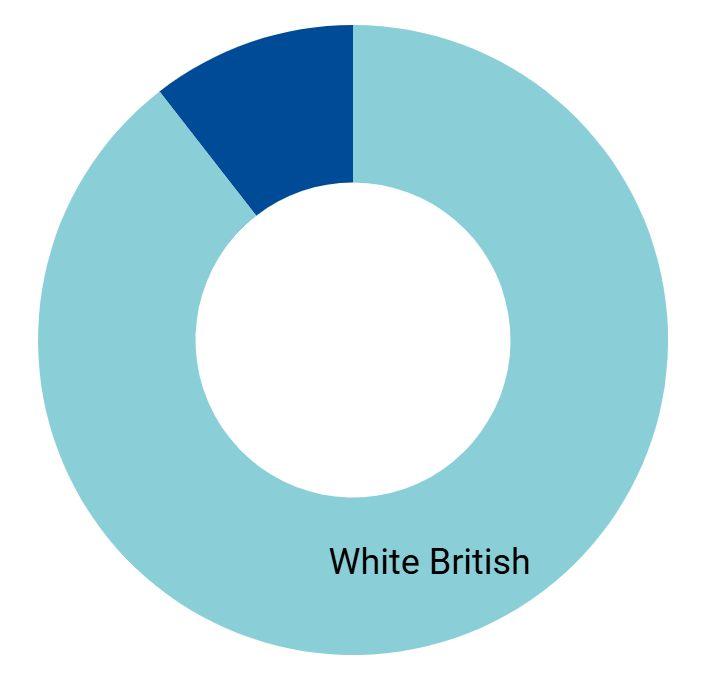


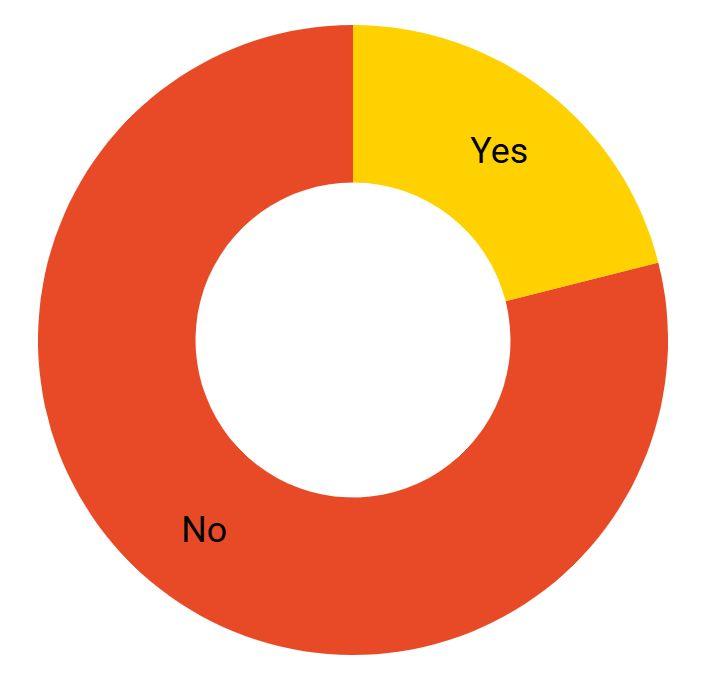


Recruitmentdetail
We agreed this recruitment criteria with Blaenau Gwent Council to ensure the final group would have a good spread across demographics (such as age, gender, ethnicity, car ownership). We also asked people about their views on climate and if they owned a car, because of their importance to the future of travel and the question.
Our sortition process oversampled groups with small percentages (one person) to ensure that if that person dropped out (such as from illness) the group would still be included.
The tables opposite compare the population of Blaenau Gwent (the target, from the 2021 census data) with the makeup of the final group of 19. The recruitment of participants achieved a good spread of people across all criteria. Three people dropped out or did not attend the forum. They were from a range of backgrounds, so the forum was still reflective of demographics and attitudes in Blaenau Gwent.

Recruitmentdetail(continued)
*Source: Ipsos Political Monitor, July 2023
*Measure ranked on average travel time to range of services for all people in Wales (GP surgeries, Primary schools, Secondary schools, Post office, Public library, Pharmacies, Petrol stations, Sports Facilities, plus measure of quality of broadband connection). 1% represents the longest journey, 100% the shortest journey. Divided into three groups 1-20%, 21-50% and 51-100%.


TheBlaenauGwentCitizens’Forumin
numbers
19 participants took part, broadly reflective of the area across demographics
364 personhours of learning, conversations, deliberation and writing recommendations
10 final recommendations deliberated on, agreed and written in participants’ own words
13 principles for fair travel, developed by the group, and written in participants’ own words

8 speakers provided information and evidence about the topic.


Vision,fairnessguidelines andrecommendations
Thecitizens’forumcreated…

Avision
The vision sets out an idea of what local travel in Blaenau Gwent should look like in the future.
Forum members developed it during the first session by thinking about what they like and dislike about travelling around Blaenau Gwent currently, and what they would like travel options to be like in the future.
13fairnessguidelines
The guidelines are a series of statements on what it means for travel in Blaenau Gwent to be fair.
The forum explained why each guideline was important to them. You can find the full guidelines in Appendix 5.
10recommendations
The recommendations are a call to action of what the council and its partners should do to improve travel in Blaenau Gwent.
They include:
● a headline recommendation
● why it is important ● practical next steps.
The forum came up with initial ideas at the second meeting. These were then reviewed by the council, advisory group, and other local groups. The forum took on board this feedback and drafted their final recommendations at their last meeting.


Vision:Whatlocaltravelin BlaenauGwentshouldbe
likeinthefuture
WhatlocaltravelinBlaenauGwentshouldbelikeinthefuture
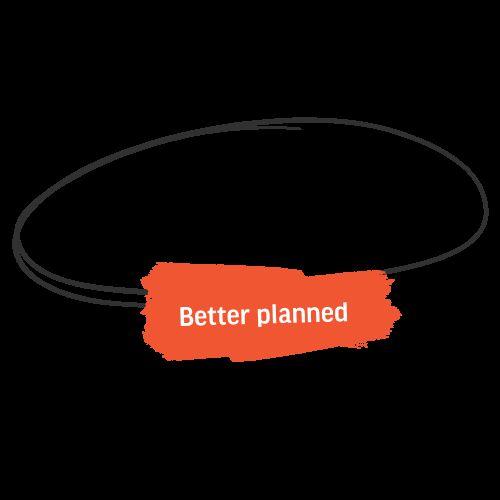
These ideas were drafted by the participants’ in their own words. The colours are for decorative purposes only. .
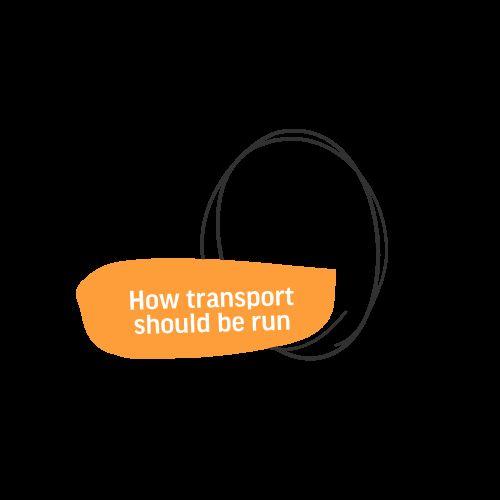


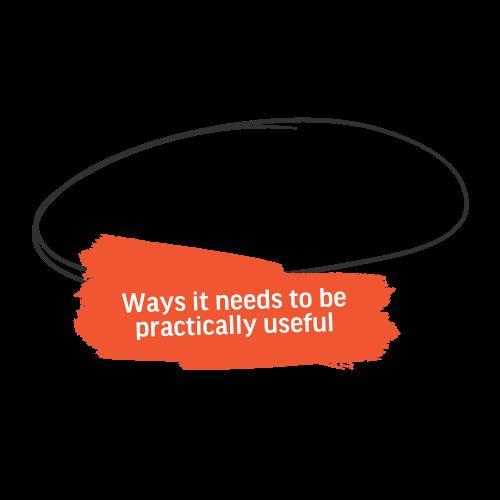
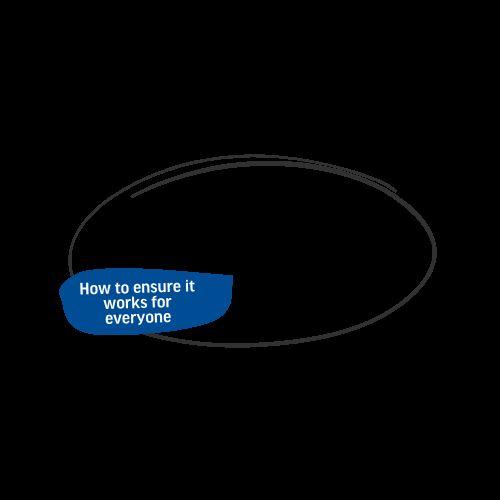

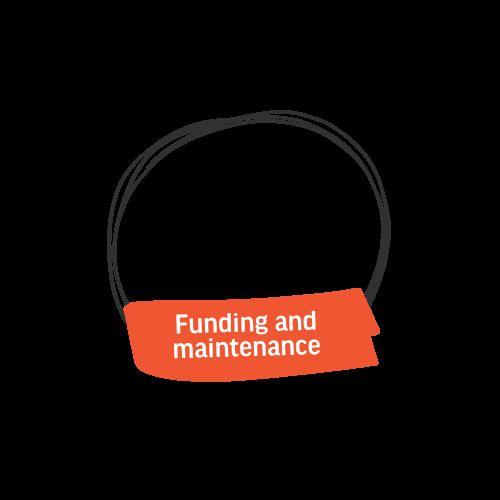
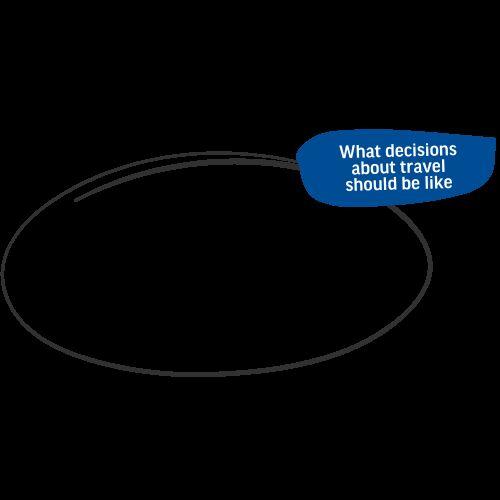
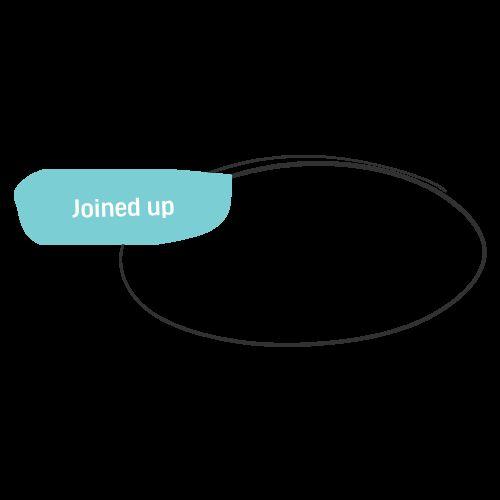

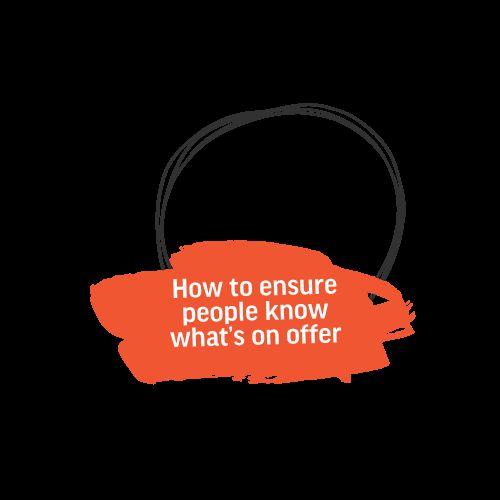


FairnessGuidelines

FairtravelinBlaenauGwentmeans…
These ideas were drafted by the participants and are in their own words. The numbers do not in order of priority or importance. You can read the full guidelines with an explanation of why they are important in Appendix 5.
1.…everybodybeingabletoaccess transportingeneral,andpublictransportin particular
2. …notcuttingclimatechangingemissions fromtransportasquicklyaspossible,ifit meanssomepeoplearemissingoutonbeing ableto accesstransport
3. …meetingpeople’s differentneeds
4. …being non-discriminatory
5. …avoidingforeseeableunintended consequences andexcludingpeoplebymistake, andminimisingthemwhentheydohappen
6. …investmentin publictransportandactive travel shouldbetheprioritysothatit’seasierfor everyonetouse(eveniftheyhaveacar)
7.…encouraginglocalbusinesses andmaking sure transportlinkstothem

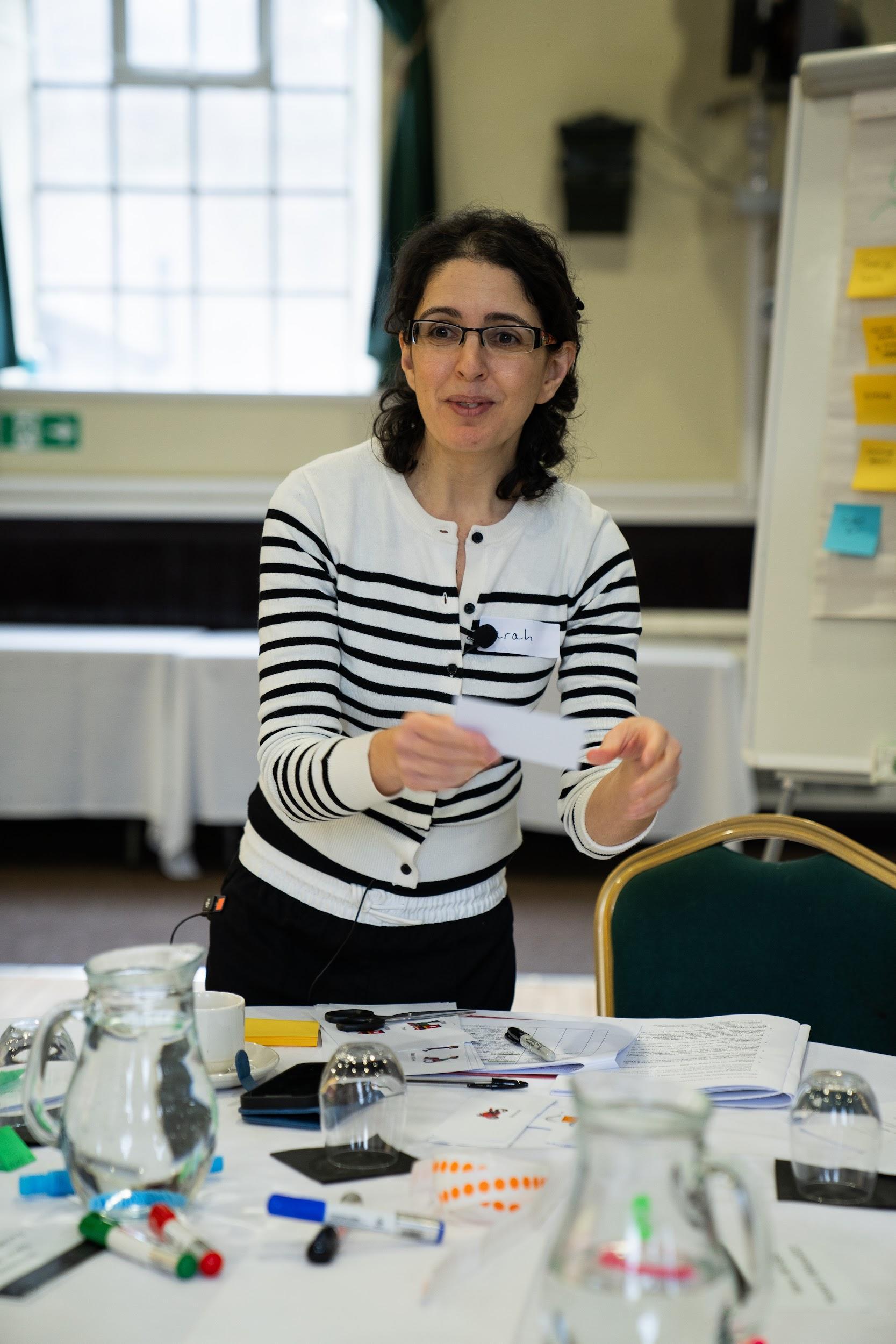
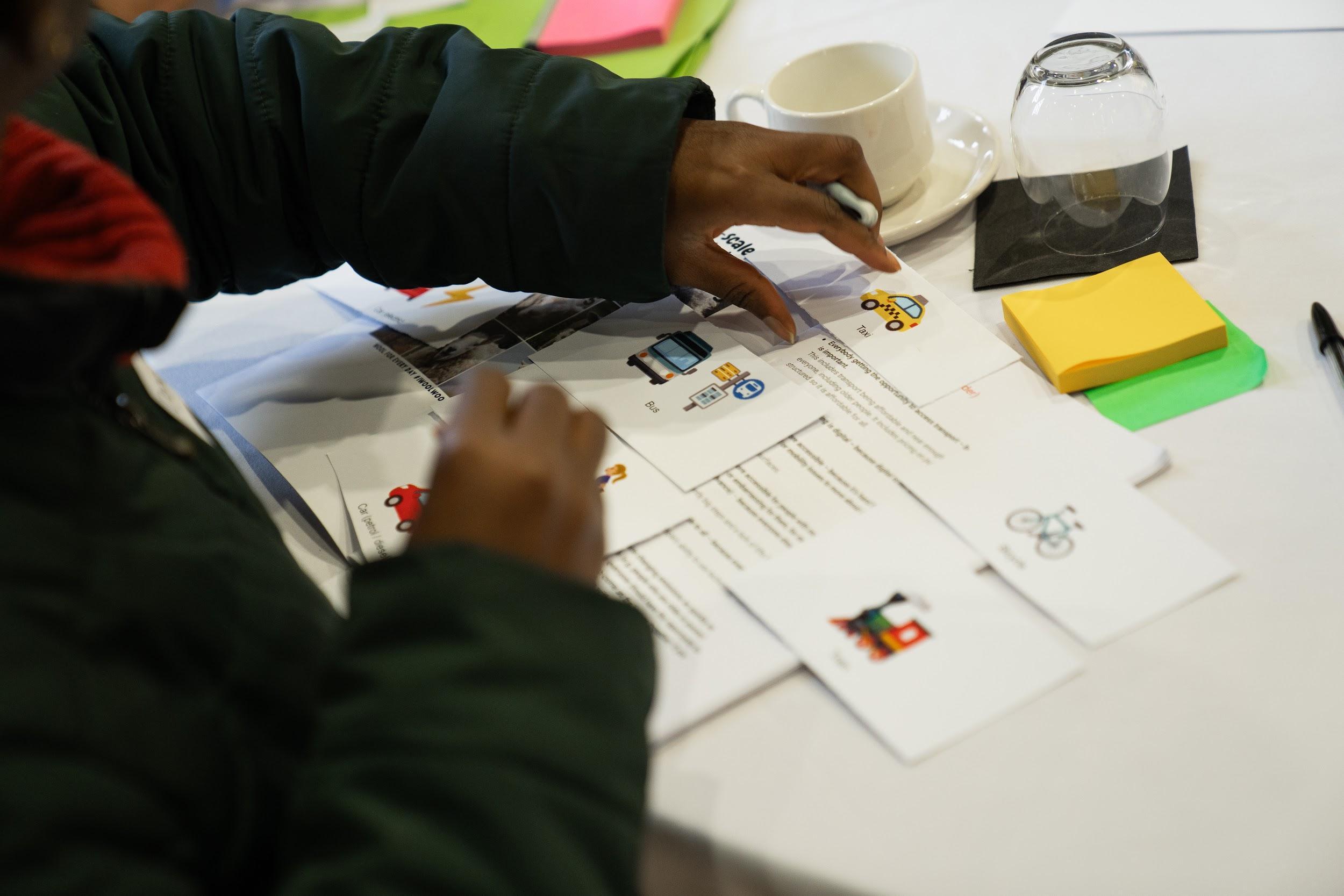

FairtravelinBlaenauGwentmeans…
These ideas were drafted by the participants and are in their own words. You can read the full guidelines with an explanation of why they are important in Appendix 5.
8. …targetingsupport (notservices*)at wherethereisgreatestneedand/orthe greatestrippleeffectofimpact
9. …beingtransparent abouthowandwhy supportistargetedatdifferentgroups
10.…notjustlookingattransport,butalso lookingat technologies,people,and processesasenablersoftransport .
11.…onlyaskingpeopletodowhattheyareable to, aslongasitissafe
12. …itisnotfairtoaskeveryonetomake changesallthetime,butyoucouldask most peopletomakeonesmallchange
13.…peoplewhocancomfortablyaffordtoshould beencouragedtocontributemore .However,itis notfairtoassumethatworkingagepeoplecan affordtocontributemore

14. …companiesdoingtheirbit.



Recommendations

Therecommendations
The recommendations are a call to action by Blaenau Gwent Council and their partners. They include: ● a headline recommendation of what to do
● why it is important
● examples of actions.
Note: The numbering of the recommendations is for reference and does not indicate order of importance
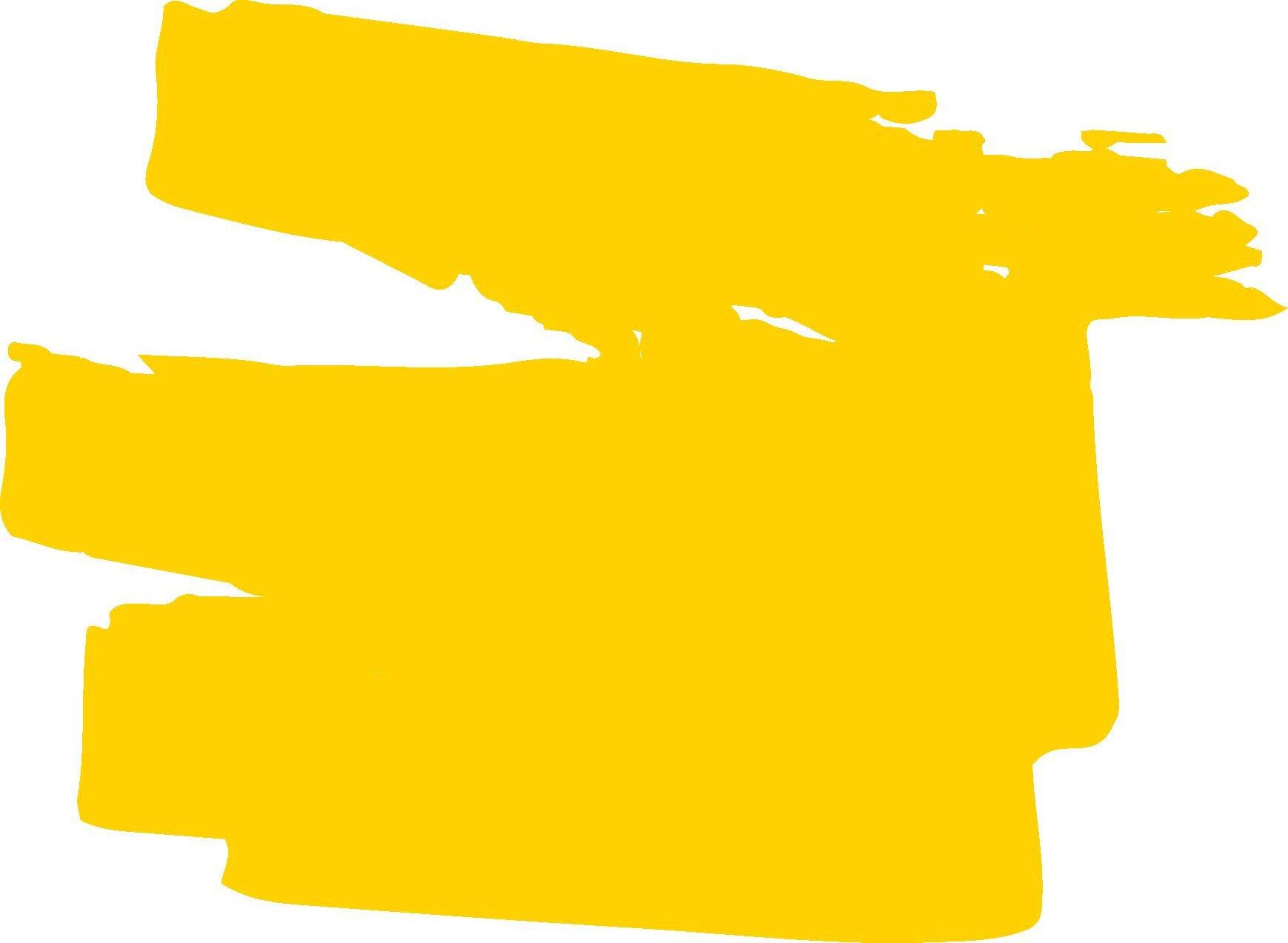



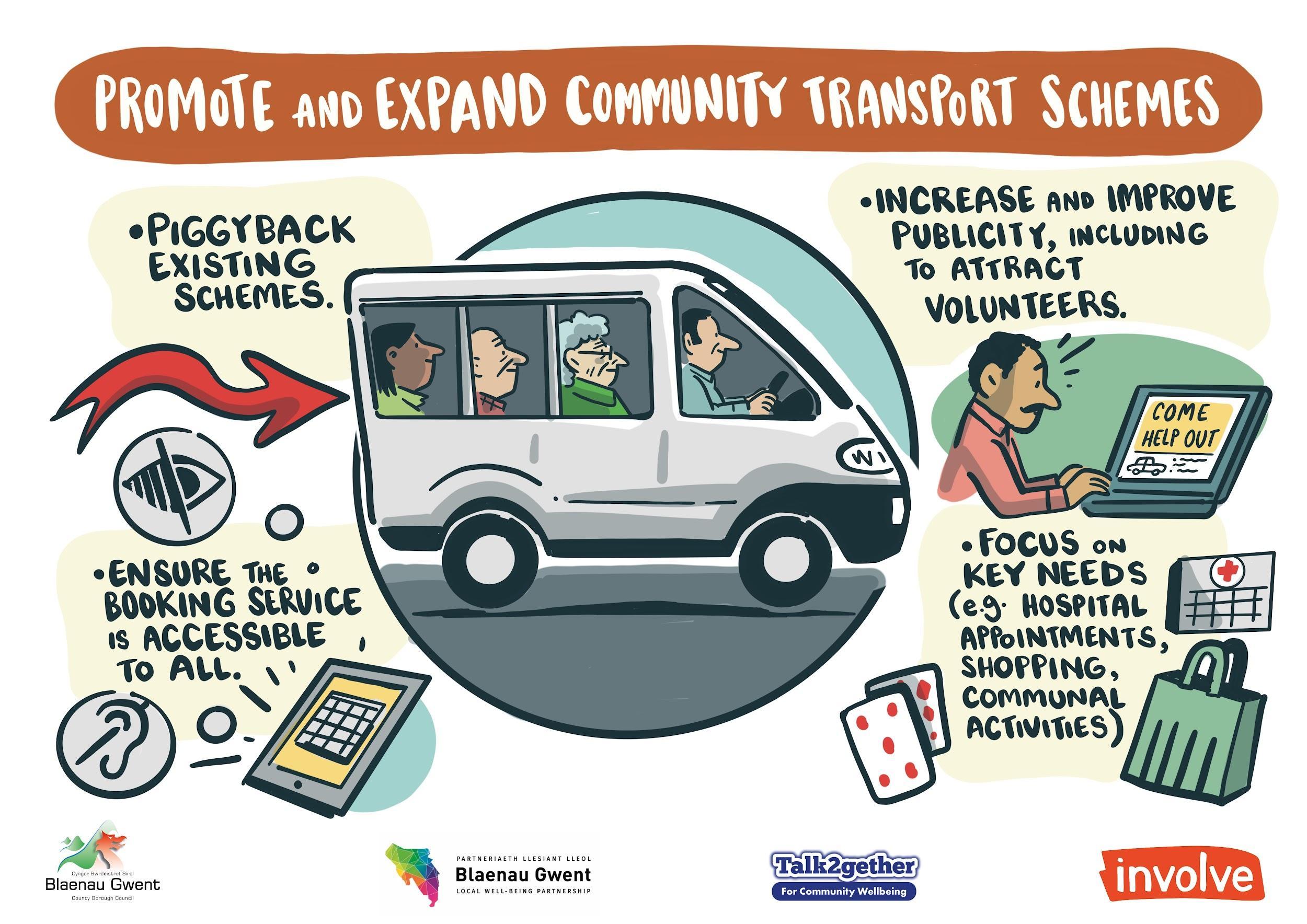

RecommendationOne:Promoteandexpandcommunity transportschemes
Whythisisimportant…
• Being able to travel to essential services should be a public good
• There is a lack of awareness about what exists. (for example, forum members hadn’t heard of it)
• Currently, there’s a lack of transport options and limited Sunday bus service
• Community transport schemes are an accessible option, especially if they are available for disabled people. They enhance quality of life, promote independence, improve social life and combat isolation
• People using community transport to go to medical appointments would take pressure off ambulances and hospital transport.
• It would also reduce cars on the road.
Practical
firststeps…
• Build on existing community transport schemes in the area, and understand what works and doesn’t work already
• Publicise the benefits of community transport with letters, leaflets, on notice boards, at events, local news, radio and social media

• Invest in a service that is easily available to book online, over the phone and in person (at hubs or directly with drivers)
• Search for funding and grants available, and cover some costs with a user paid service
• Build a base of volunteers first. Regularly promote volunteering with clear messaging, and ensure drivers are not out of pocket
• Focus on key needs like health services, town centres, and communal places
• Fund a paid coordinator, to manage volunteers and make sure it is available a week in advance
• In the future, invest in electric vehicles to future proof the scheme.
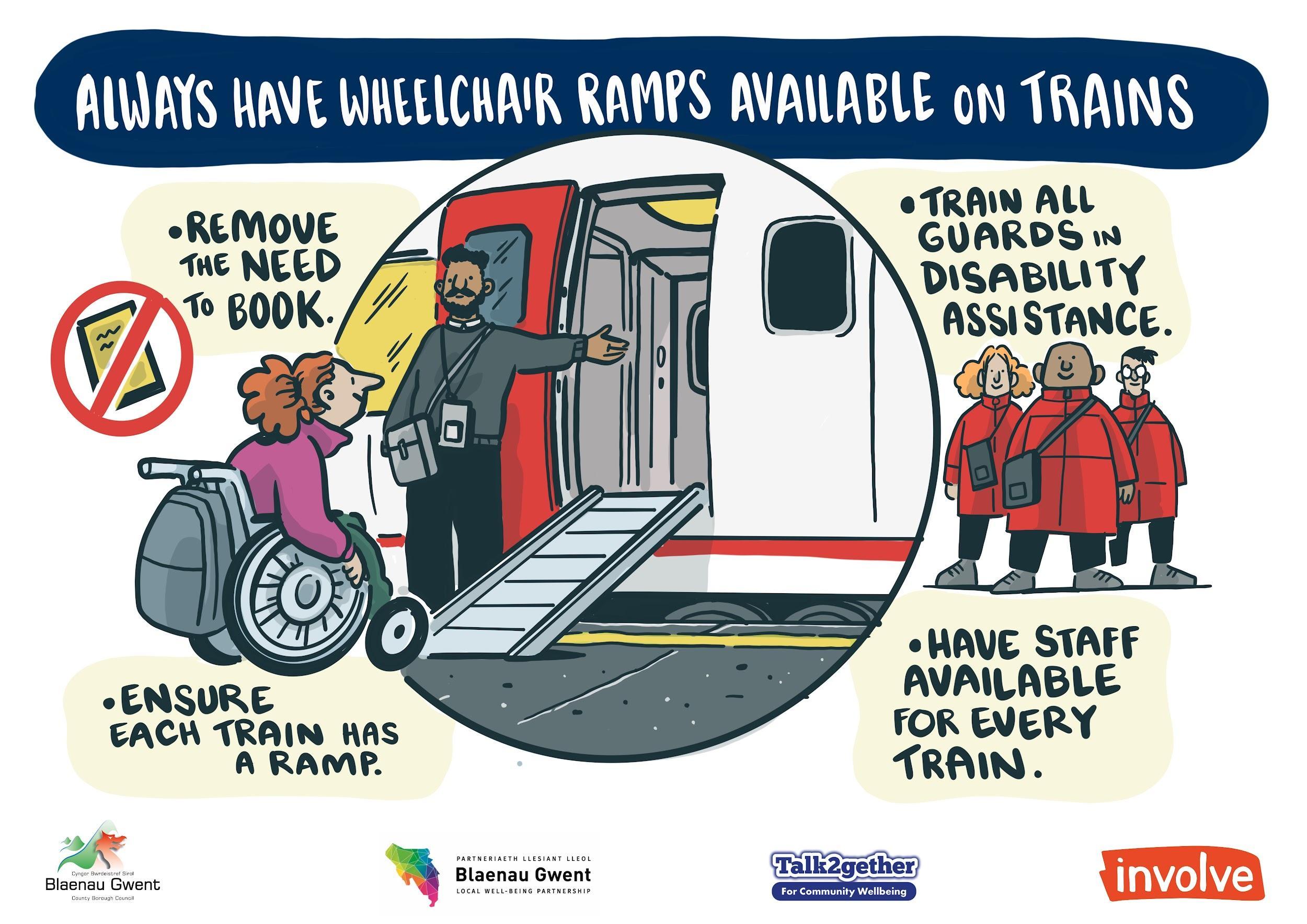

RecommendationTwo:Alwayshavewheelchairramps availableontrains
Whythisisimportant…
• For inclusion, as it allows disabled people easy access on and off trains
• For people’s dignity, allowing the person to have independence
• For safety, as it is essential to avoid accidents
• It avoids the inconvenience of booking and the need for disabled people to pre-plan their trips.
Practicalfirststeps…
• Remove the need to book disability assistance in advance

• Ensure every train has a ramp facility (not just platforms)
• Ensure all railway staff are trained in disability assistance
• Not all stations have a ticket office, so this needs to be addressed by making sure that staff on trains, such as conductors, are available and able to help.
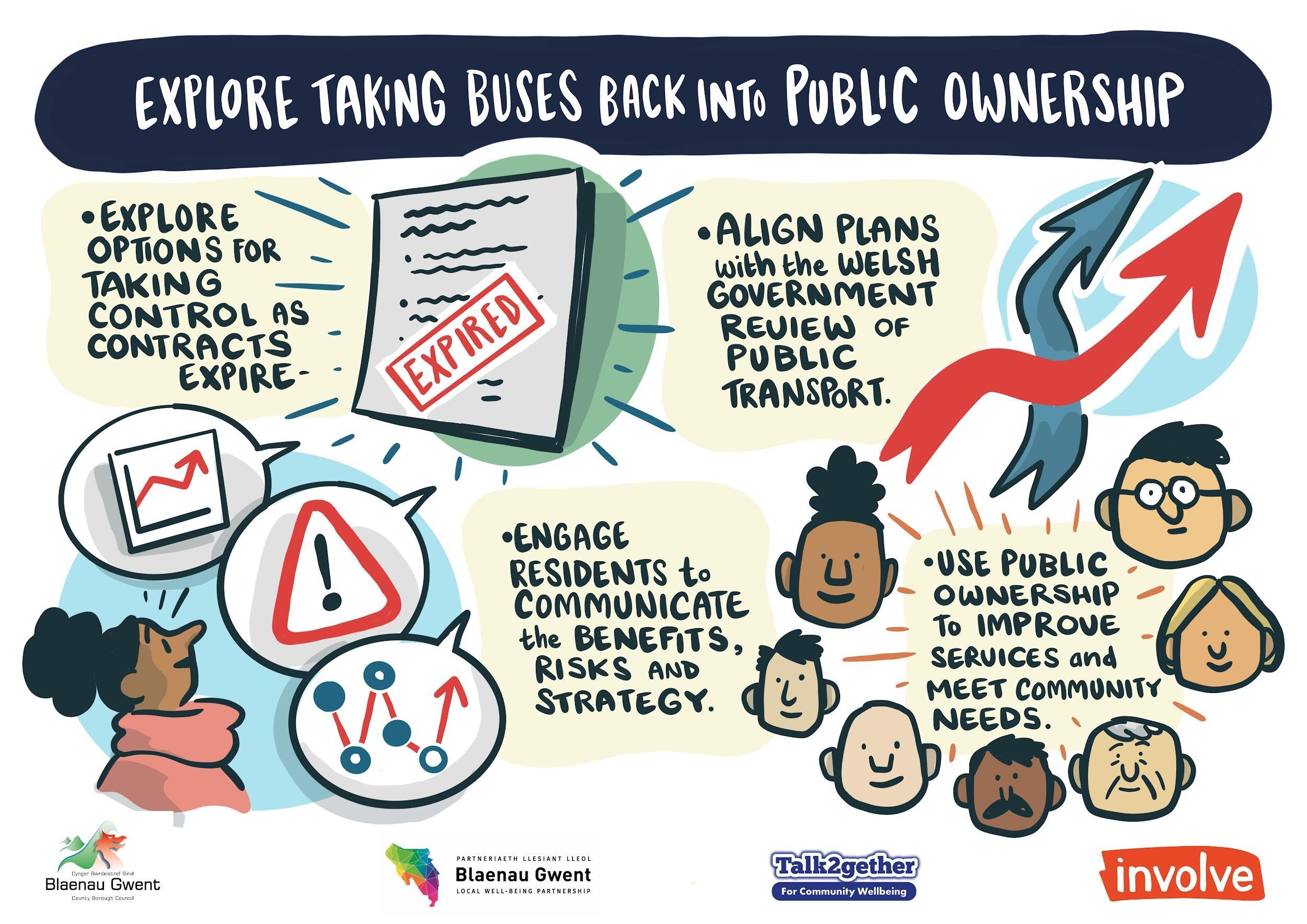

RecommendationThree:Exploretakingbusesbackinto publicownership
Whythisisimportant…
• Public need: 23% of Blaenau Gwent residents do not own a car. A publicly owned bus service would ensure accessibility for all, especially in rural areas.
• Economic benefits: revenues generated could be reinvested to improve services and coverage, rather than to maximise shareholder profits.
• Reliability and coverage: public ownership allows the council to improve the reliability of services and ensure even non-profitable routes are maintained, ensuring the service works for everyone.
• Affordability: public ownership allows for fare regulation, including subsidies for young people and lower-income commuters, making travel more accessible.
• Sustainability: revenues generated by a publicly owned service could be reinvested into greener buses, reducing carbon emissions, and helping meet net-zero targets.
• Accountability: with a publicly owned model, the council would have oversight, ensuring decisions are made in the best interest of the community.
Practicalfirststeps…
• Council-led transition: the council should explore the option of taking control of the bus service as private contracts expire.
• Government support: the council should align this initiative with the Welsh Government’s review of public transport, for funding and policy backing.

• Service improvements: the council should work with residents to agree and implement minimum service levels, improve route frequency and coverage, ensure connectivity to key locations such as schools, hospitals and industrial sites.
• Learning from elsewhere: the council can take inspiration from other areas in the UK where publicly owned transport works well.
• Stakeholder engagement: the council should continue to work with local schools, businesses, and healthcare providers to ensure the service meets community needs.
• Public engagement: the council should engage with residents to communicate the benefits, risks, and long-term strategy of a publicly owned transport system.

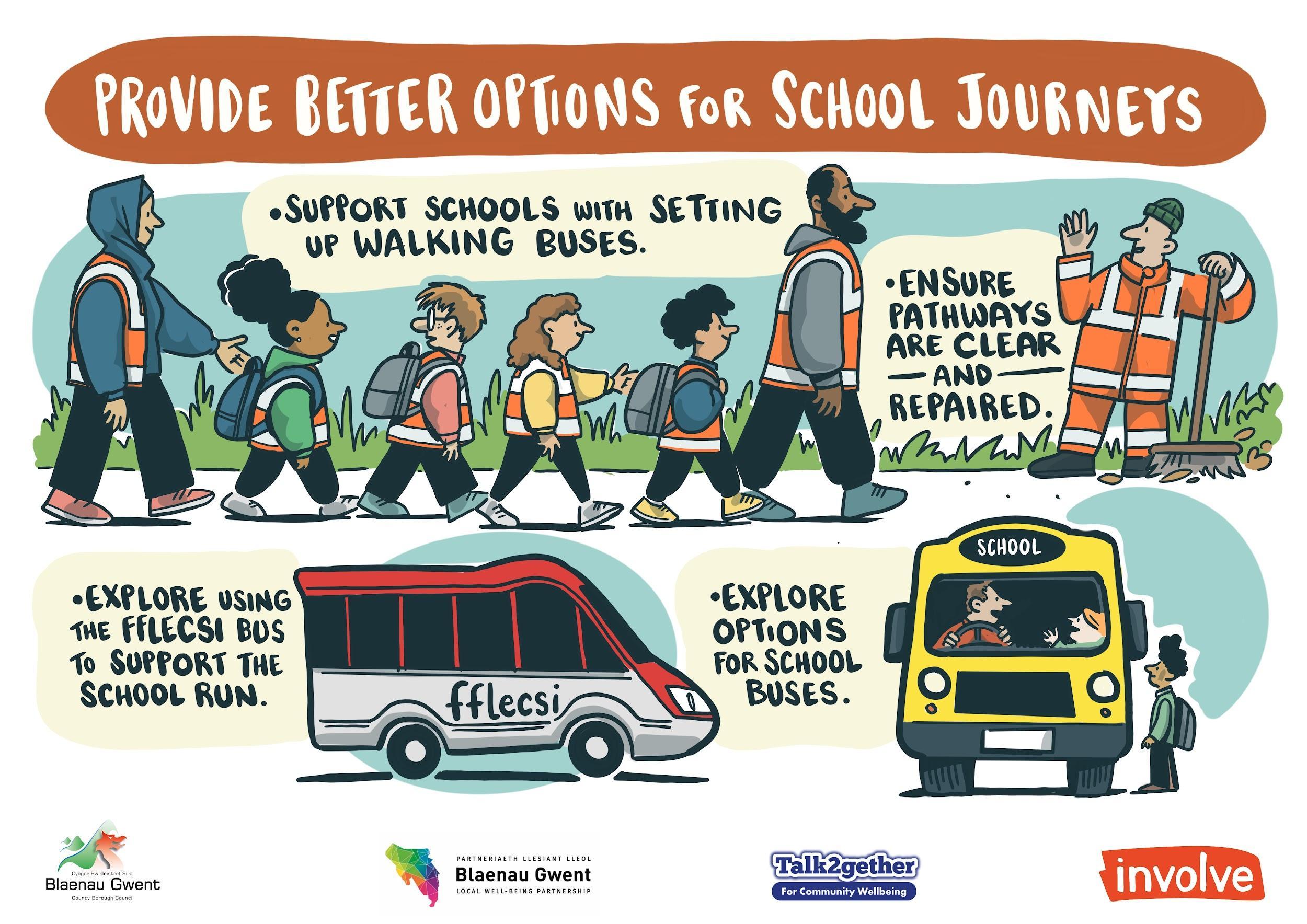

RecommendationFour:Providebetteroptionsforschool journeys
Whythisisimportant…
• Congestion and emissions: It eliminates parking issues for local residents and congestion around schools. Fewer cars will reduce emissions, improving health
• Education: It increases school attendance and attainment
• Safety: Fewer cars near schools will reduce accidents
• Health and wellbeing: The walking bus promotes independence, exercise and a social group outside of school. It gives parents freedom and assurance that their children will arrive safely
• It is fair to all, as those who work would benefit from the school bus, and a walking bus is an affordable option.
Practicalfirststeps…
• Local authorities should explore providing more transport options for all pupils, at a minimal and fair cost to parents (subject to budget constraints).

• Pilot school buses in one area, initially targeting larger primaries. Explore how to incorporate the fflecsi Bus into this system.
• Consider a shared pick up space for school transport (e.g. supermarket car park): this would be more suitable for pick up than local bus stops.
• Schools should support with the setup and costs of walking buses.
• The council should ensure pathways are clear and repaired.
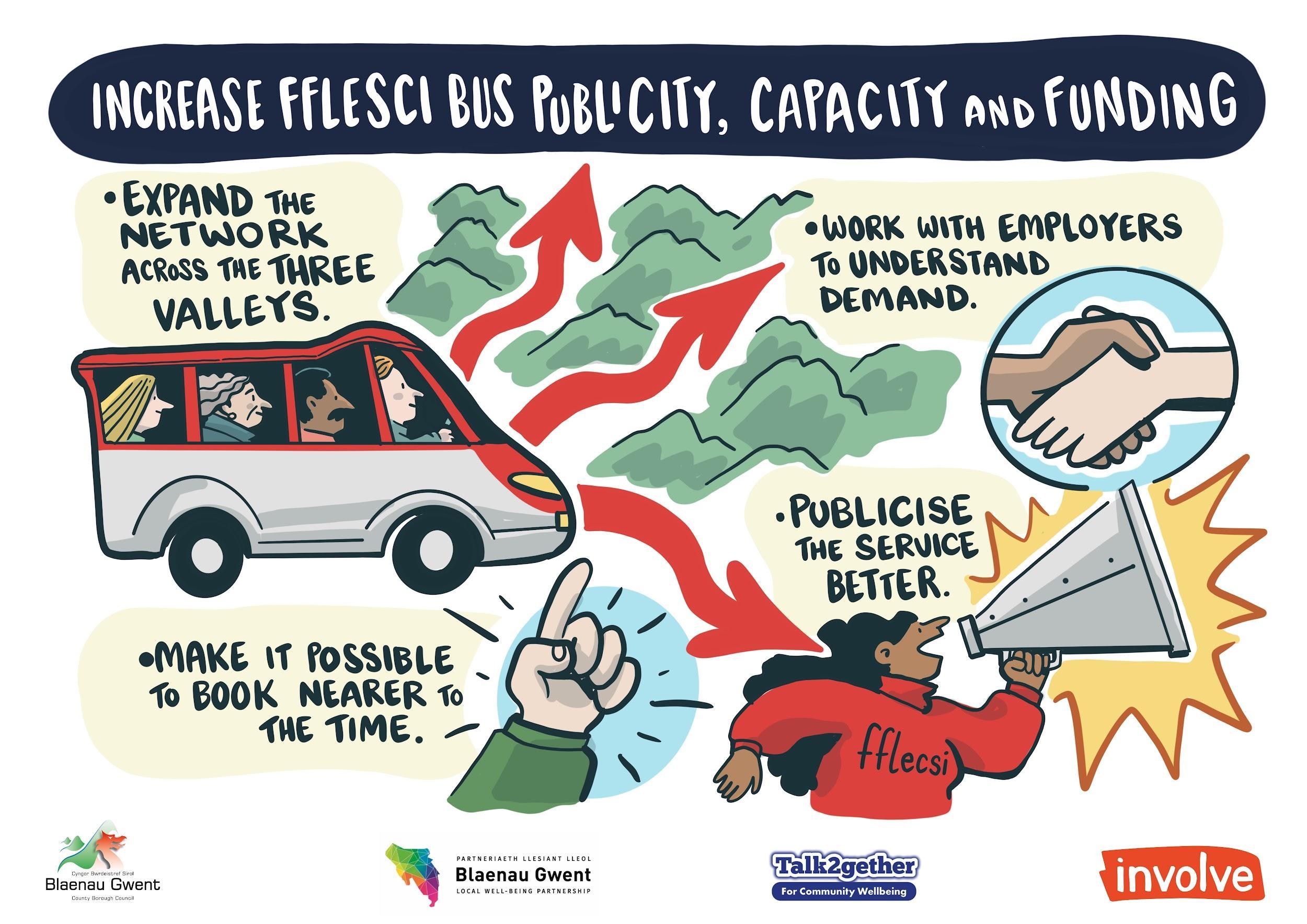

RecommendationFive:Increasefflecsibuspublicity, capacityandfunding
Whythisisimportant…
• The current service does not cover all three valleys.
• There is no regular transport available during off peak times and weekends, which means shift workers struggle to get to work. People are having to pay for taxis to get to work and sometimes cannot afford it and risk missing out on employment.
• Not many of those who want and need the service know about it due to a lack of publicity, especially those new to the area.
• The current lead time to get a booking on the fflecsi app is close to two to three weeks
• The fflecsi app is a bit glitchy and sometimes does not allow you to view existing bookings or says the bus is full even when only four to five seats occupied.
Firststepsforthecouncil
• Expand the network across the three valleys (Ebbw Fach, Sirhowy, Ebbw Fawr).
• Extend subsidised travel for the young working population.
• Publicise the existing offline channels for bus booking, to overcome tech barriers for some demographics.
Futurestepsforthecouncil

• Lobby Transport for Wales to increase funding for fflecsi to increase coverage and services in Blaenau Gwent and adjacent areas.
• Track usage of service following changes, and decide what further changes or improvements need to be made after the first 6 months to 1 year.
• Improve availability so that people are able to book 2-3 days ahead or on demand, instead of 2-3 weeks. Ensure availability of seats so that people who need to use the service can.
• Improve publicity and marketing of fflecsi services both across offline and online channels (social media ads) like council tax bills, pop up stalls at events, on weekly market days.
• Work with employers, especially those around industrial estates, to understand demand and publicise the service to employees. This will also enable non-drivers to work.

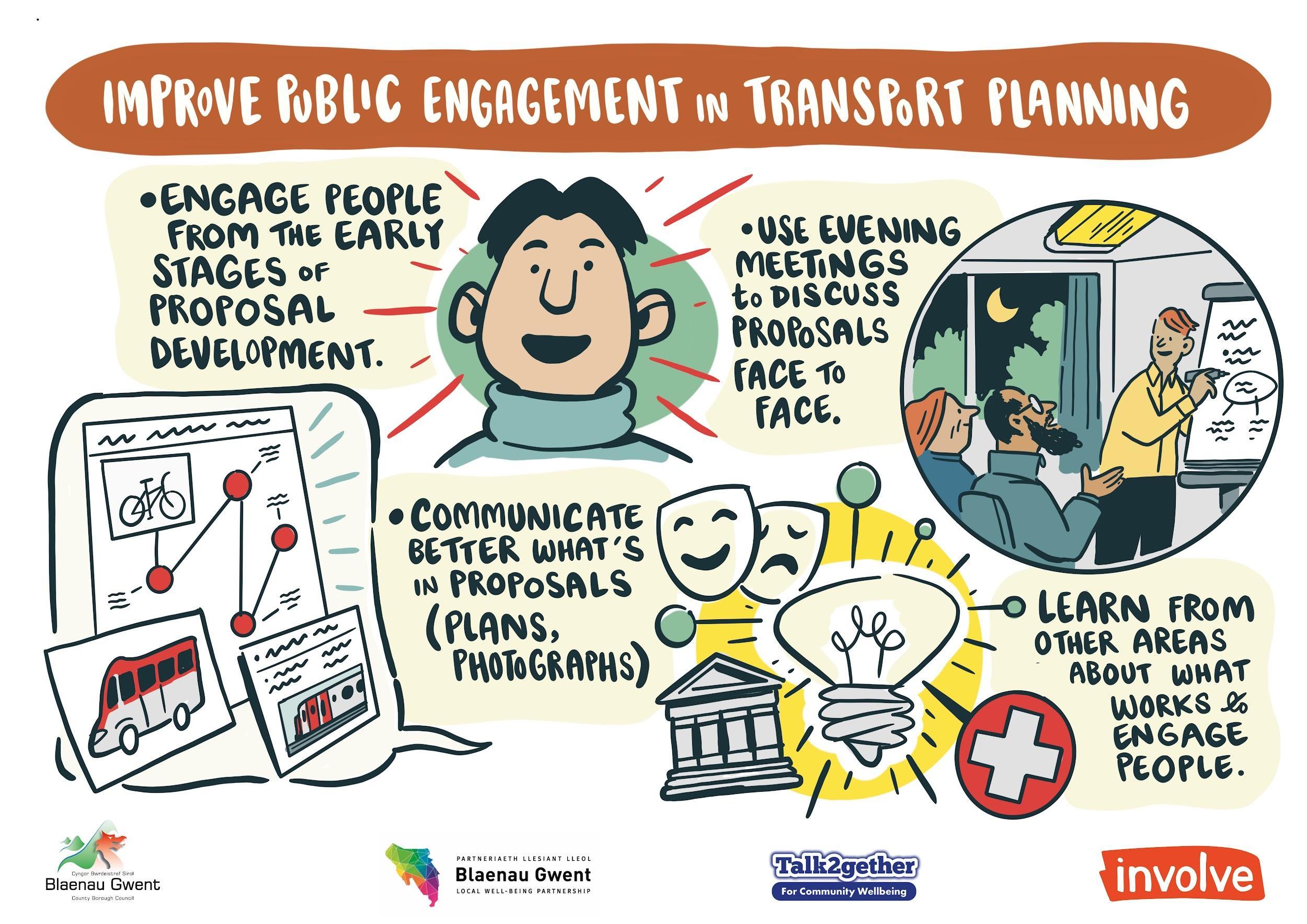
RecommendationSix:Improvepublicengagementin transportplanning
Whythisisimportant…
• Residents need to be informed of what’s happening in our area before a decision is made
• People need a voice on what’s important to them
• There should be an opportunity to discuss and prioritise where public money is spent, e.g. on cycle paths instead of filling potholes
• Residents’ expertise and knowledge is as important as the experts’.
Practicalfirststeps…
• Evening meetings to discuss any proposals face-to-face, held across Blaenau Gwent in community halls, council chambers, chapels

• Meetings should be well publicised, by social media (including community pages), flyers (through doors and key venues), and posters (shop windows, e.g. post office)
• Better communication of what’s in proposals, so people can give their feedback (including plans and photos
• Engagement at multiple stages, from the early stage of proposals and with more engagement of people before plans are finalised
• The council should share information about what is working in other areas, including taking local people to other similar areas to see what good public infrastructure looks like.

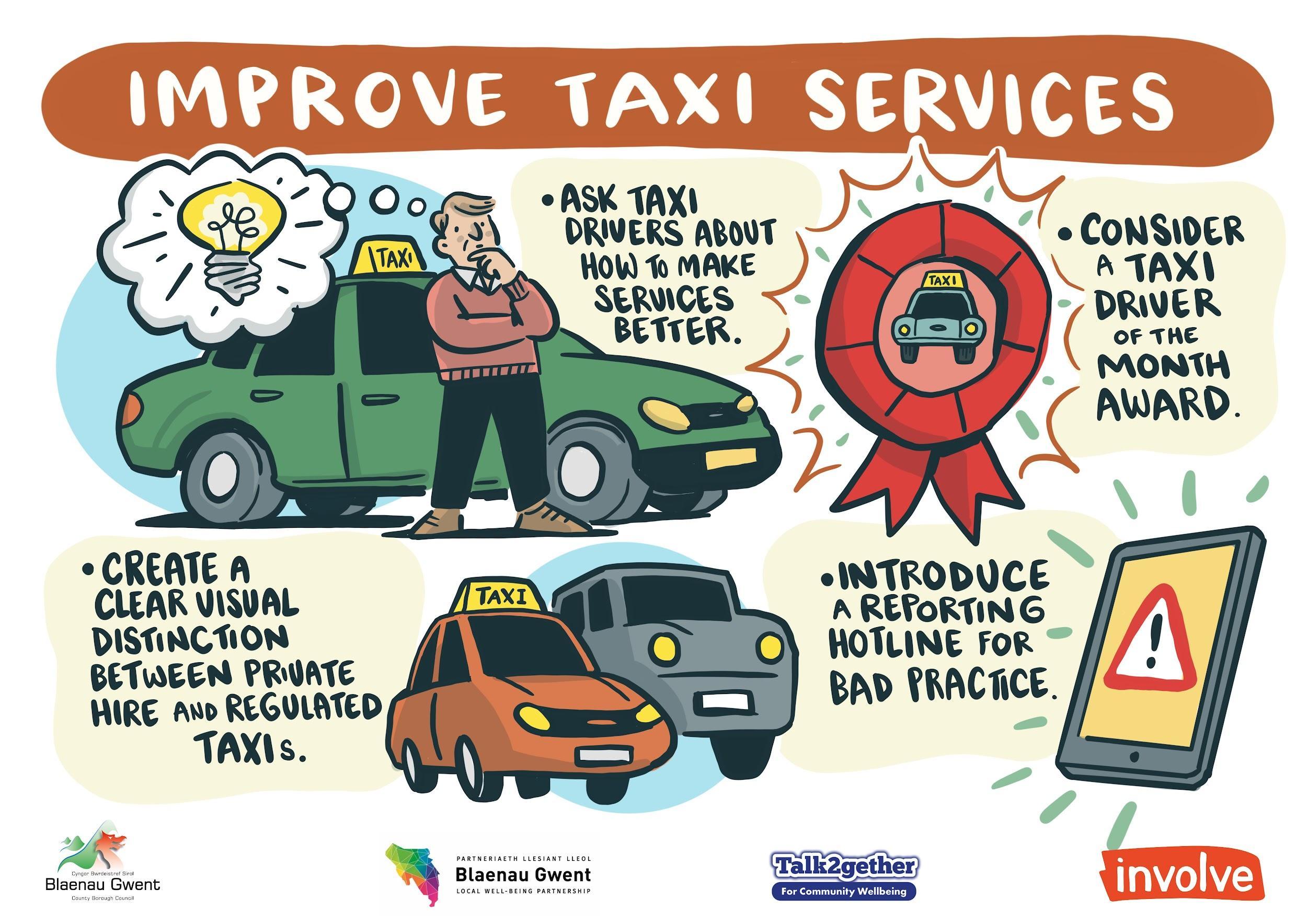
RecommendationSeven:Improvetaxiservices
Whythisisimportant…
• Currently there is an inconsistent service and unclear fares
• There is a public perception that taxis don’t work
• It will make them better trusted
• At some times of day and locations, there is no alternative to taxis
• Making taxis fairer would improve public trust, confidence, and usage.
Practicalfirststeps…
• A visual distinction between private hire and regulated taxis, e.g.: colour, lights

• Explore inviting Uber, Lyft or other such companies into the area
• A taxi reporting hotline to report bad practice
• Consider using the license agreement to have badges with details on taxis and inclusion of antisocial hours working agreement. Every taxi should have a badge sticker with that detail on there, as part of their license agreement. Advertise this hotline and make sure there is follow up with the person reporting.
• Council to ask taxis how to support them to improve their service
• Consider a publicised taxi driver of the month award.
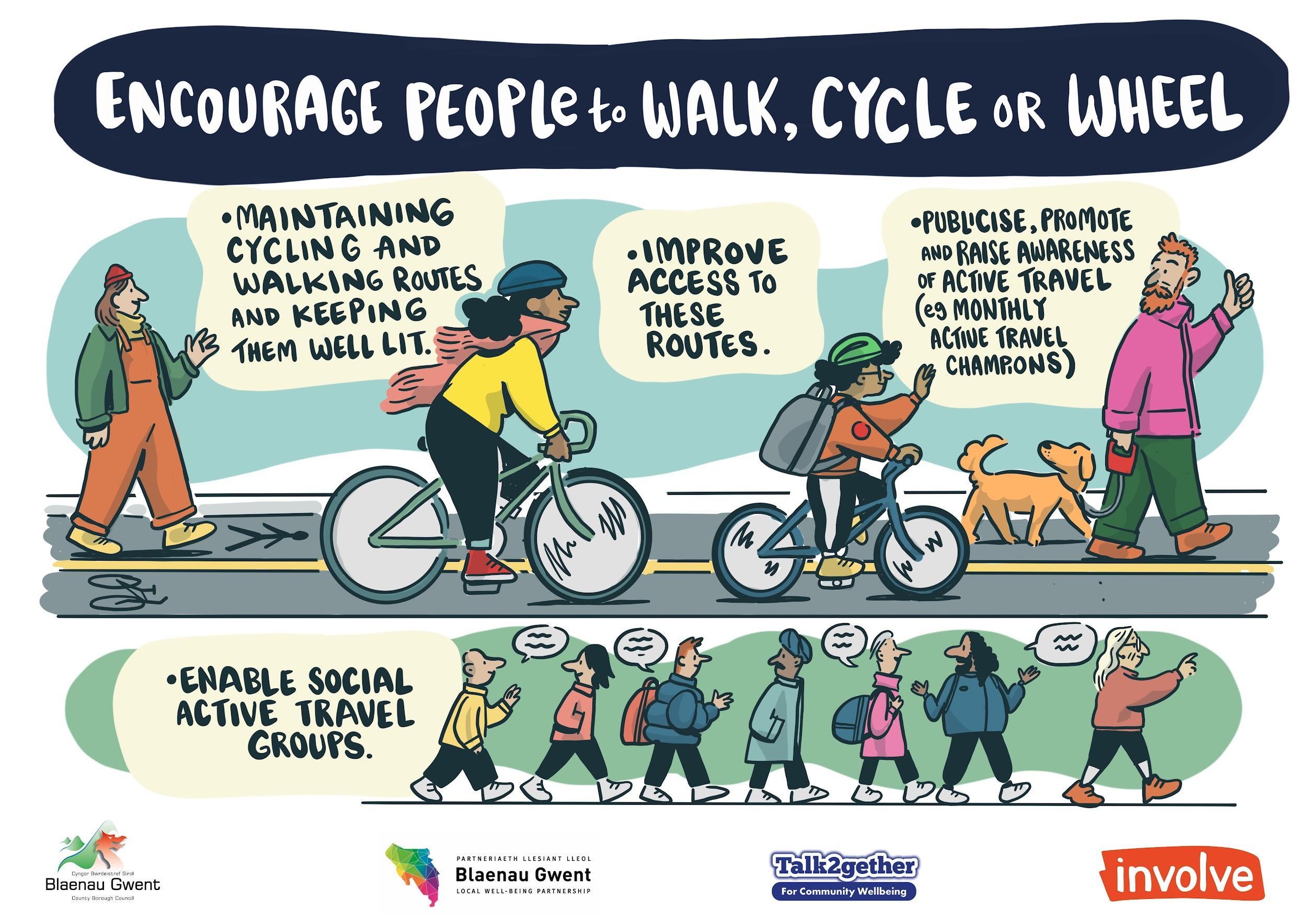

RecommendationEight:Encouragepeopletowalk,cycle orwheel
Whythisisimportant…
• It will reduce emissions and climate change
• Better health and wellbeing outcomes
• It is cheaper for individuals
• It is potentially quicker for short journeys
• There would be less congestion
• A safer walking and cycling experience (or just the perception of greater safety) will increase uptake
• Leisure walking and cycling events and groups can easily convert into active travel
• If successful, it will change the mindset of the public and reduce car usage for short journeys.
Practicalfirststeps…
• Consider using apps like Strava or Fitbit to have a “monthly Blaenau Gwent active travel champion”.
• Keep cycle and walking routes safe, maintained and well lit. Ensure that surfaces are not potholed and usable, with safe access to the routes.
• Promote and publicise pathways, routes and access (e.g.: on social media, local apps, newspapers, leaflets at doctors surgeries, libraries and mailouts).
• Host active council events like meetings, town centre initiatives, meetups to enable social active travel and raise awareness. These could be themed.
• Run school education campaigns, including cycle and walk to school initiatives, bikeability training for children and parents. The council needs to consider that this recommendation may not suit those with disabilities or all ages. Likewise active travel might not be adequate for journeys with heavy loads or with children.
• Modify school start and finish times to allow parents to collect from separate schools by walking.
• Improve storage and locking facilities, (in new builds, bus and train stations, shopping centres, supermarkets, car parks).

• Explore if there are any grants for storage, funding cycle equipment, or for publicity. Lobby for further funding wherever possible.
• Publicise the UK National ‘cycle to work scheme’ and publish employers that offer it. Encourage other local businesses to offer it.
• Lobby ‘Go-Safe’ Wales to enforce 20mph speed limits near ‘critical places’ such as schools, narrow pathways or other areas where pedestrians or cyclists come close to the road.
• Conduct a study to explore whether an e-bike or cycle sharing scheme is feasible in Blaenau. There are pros and cons to this in a hilly area, but it is strongly recommended for further exploration.

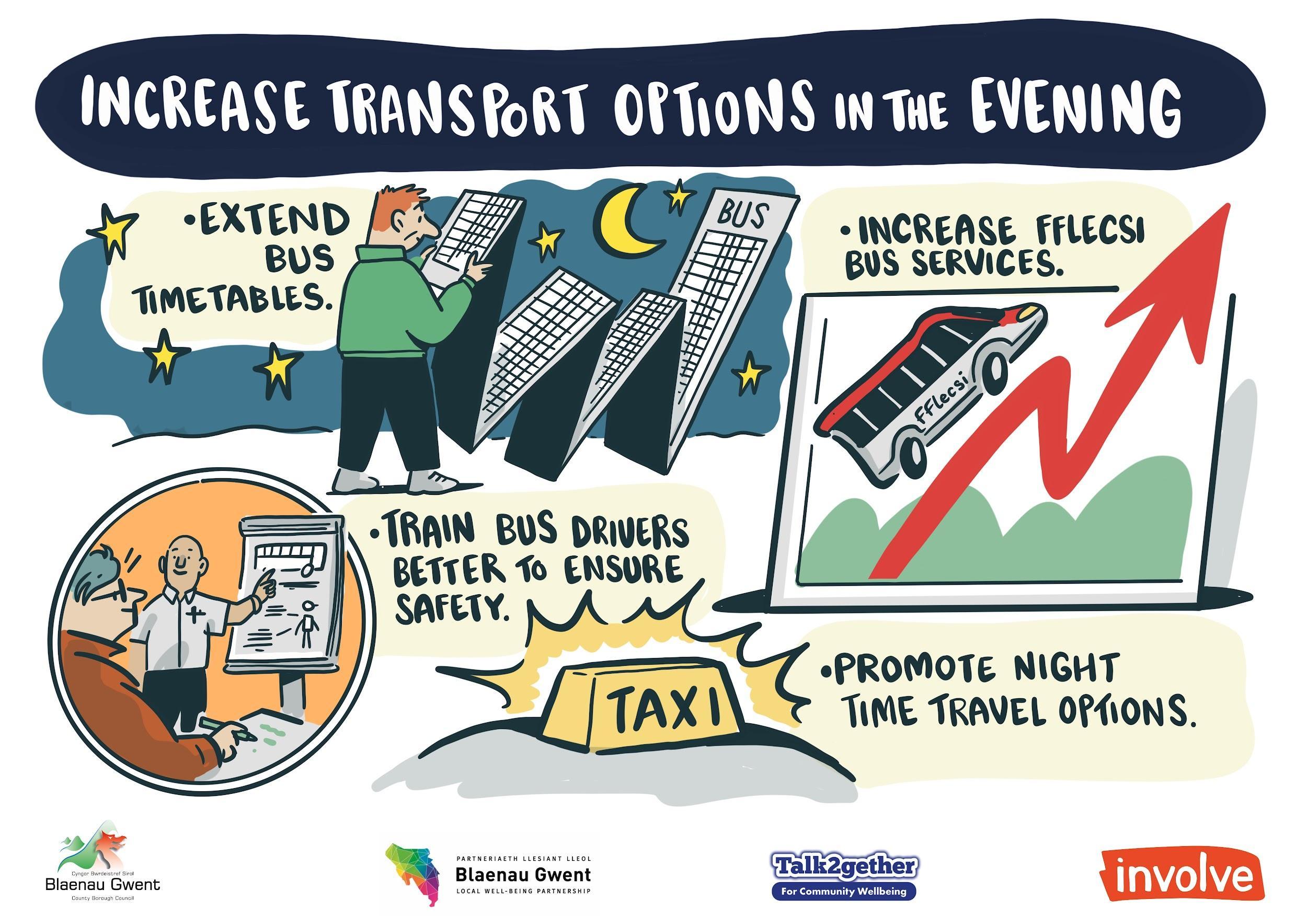
RecommendationNine:Increasetransportoptionsinthe evening
Whythisisimportant…
• Helps wellbeing and the quality of people’s social lives
• Supports shift workers with meeting their work commitments
• It links nearby communities together
• Improves the nightlife experience
• Creates jobs for local people, including drivers
• At the moment, transport does not cover all of Blaenau Gwent or prioritise safety within the community.
Practicalfirststeps…
• The council should lobby bus companies for extended bus times and night time travel.

• Promote local taxis on council websites, social media, and at recreation centres like pubs.
• Support more fflecsi buses for night shift workers
• Training for transport staff to ensure safety for drivers and passengers
• Ensure better publicity for night time travel options, for example through libraries and social media posts.
• Communications like posters on buses and bus stops to create awareness of intoxication and that drunk passengers can be refused at night

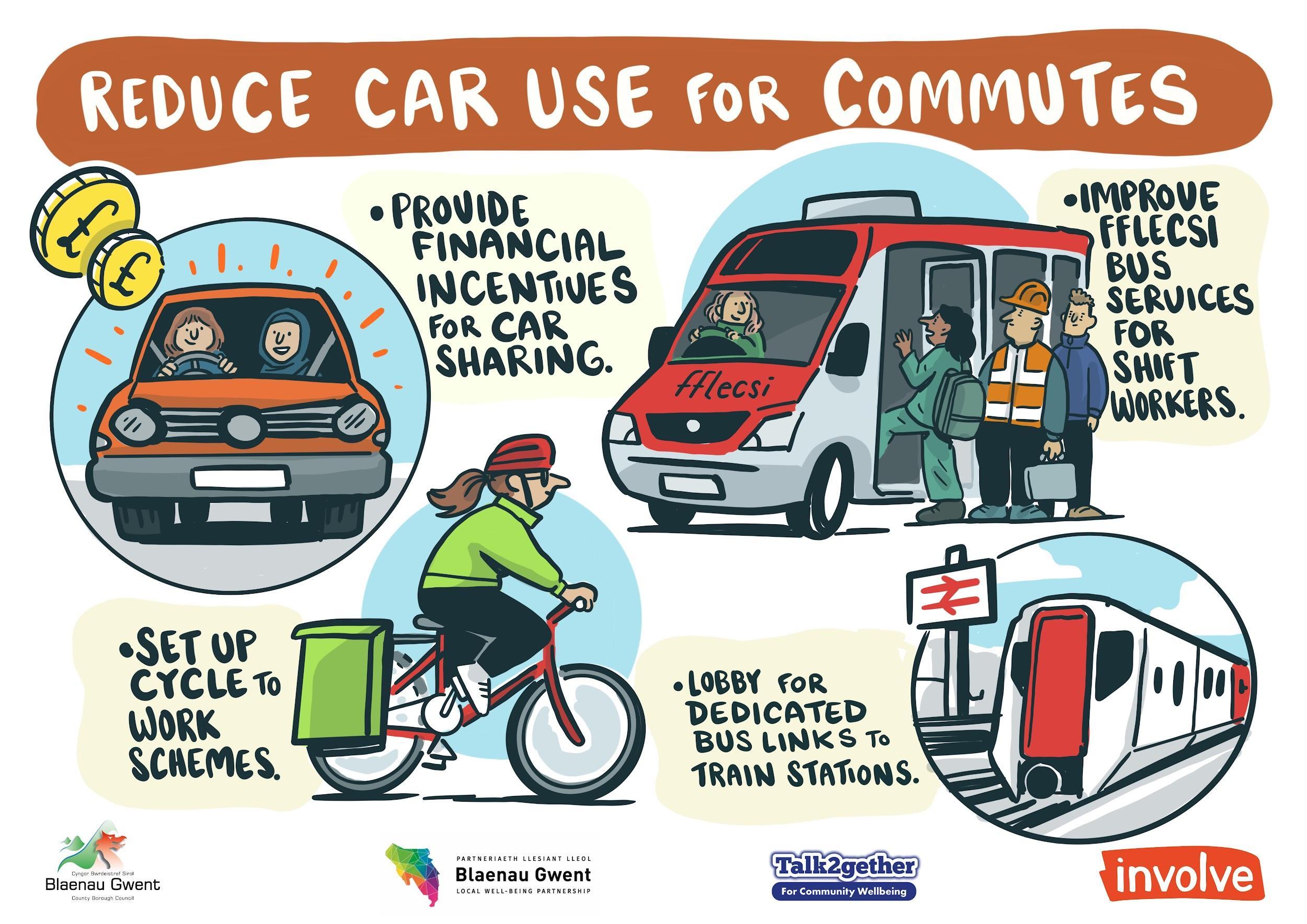
RecommendationTen:Reducecaruseforcommutes
Whythisisimportant…
• It is not working now because there are lots of cars are on the road due to a lack of other transport options to get to work, like buses.
• There will be better air quality and a greener climate.
• It will reduce traffic on the roads, which reduces wear and tear, potholes and means that roads need less maintenance.
• It helps people who don’t own cars, as well as reducing the car use of people who do.
Practicalfirststeps…
• Encourage workplaces to set up cycle to work schemes and support them to organise car sharing, offering financial incentives such as claiming mileage for petrol.

• Communication between employers, buses and the fflecsi bus to support people to get to work on time with accessible and frequent buses.
• Promote the fflecsi bus better.
• Provide better dedicated bus links to the train station, supporting people to get to work on time in Newport and Cardiff. This will mean ensuring buses arrive 10 to 15 minutes before the train departs.
• Ensure enough capacity of buses during peak times at night for communing home.


Participantexperience
"Very good and informative sessions. Felt that everyone had a voice and we came up with some really good suggestions."
People rated their experience of the forum sessions highly, with most rating them as excellent. They particularly appreciated the presentations and how informative the sessions were, the facilitation and the general organisation of the event.
In terms of things to improve, a one person suggested shorter days and one person more reassurance about privacy of the photography. Four people said nothing.
“It worked like a well oiled machine”
"They were well run, good pace and inclusive. We got a great outcome."
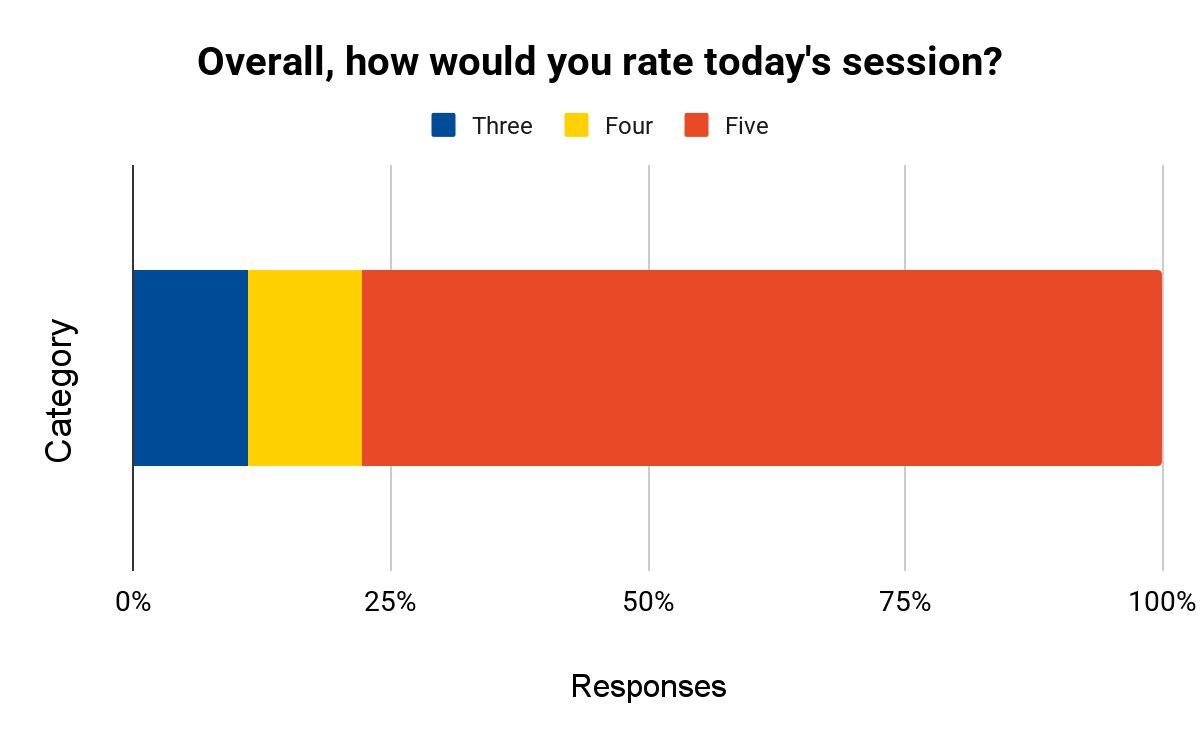

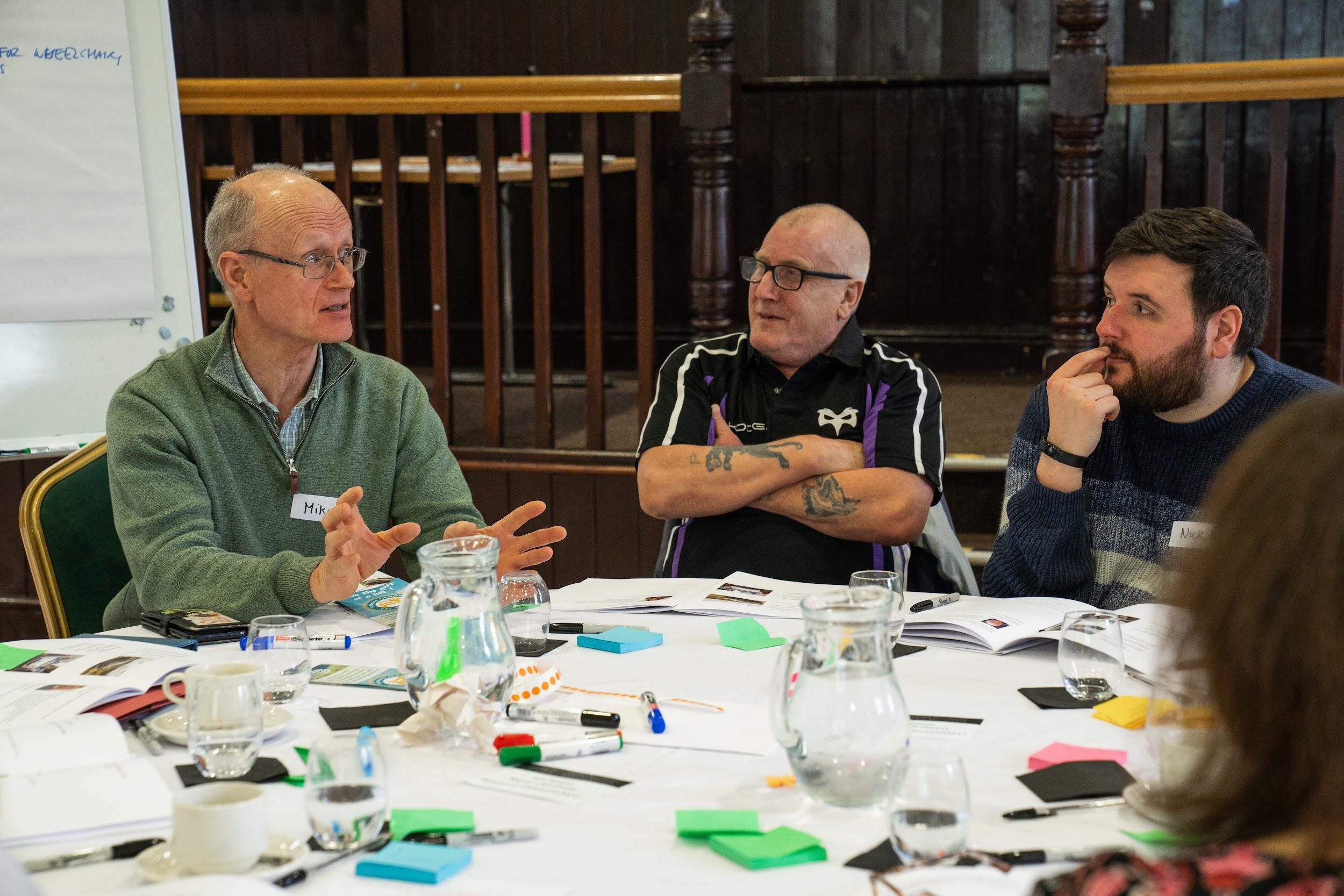

Hopesforwhathappensnext
“I feel that my opinions were accepted and listened to. Hopefully now those in positions of power will also take notice and act accordingly"
When asked how they felt about the engagement process, forum members said they were positive, engaged, listened to, valued, and enthusiastic. They hoped that their recommendations will be acted upon, with some scepticism as to whether that would happen. When asked for impacts they hoped to happen as a result of the process, forum members said about more travel options, more sustainable travel and better public awareness and engagement. There was a large overlap between their hopes for the households and for the local area.
Some of the forum members attended a follow up event and a youth forum meeting afterwards. You can see the summaries of these meetings in Appendices 6 and 7.
Inmyhousehold
Greener, affordable options
Easier ways to travel
More travel options so I can reduce car use
Bus services for my children
Financial savings

Inthelocalarea
Better public transport for all
A greener
Blaenau Gwent
More public involvement
More public awareness
Less congestion
Better buses
More linked up travel


Thoughtsontravel
Forum members were asked their thoughts on the future of travel and climate change in their community, before and after the forum. The results for those forum members that gave their views are below.
More members wanted to make changes to the impact of their travel. Generally they understood more about how net zero travel may affect them, and felt their community would have a say. There was the greatest increase in confidence about the future of travel in Blaenau Gwent.

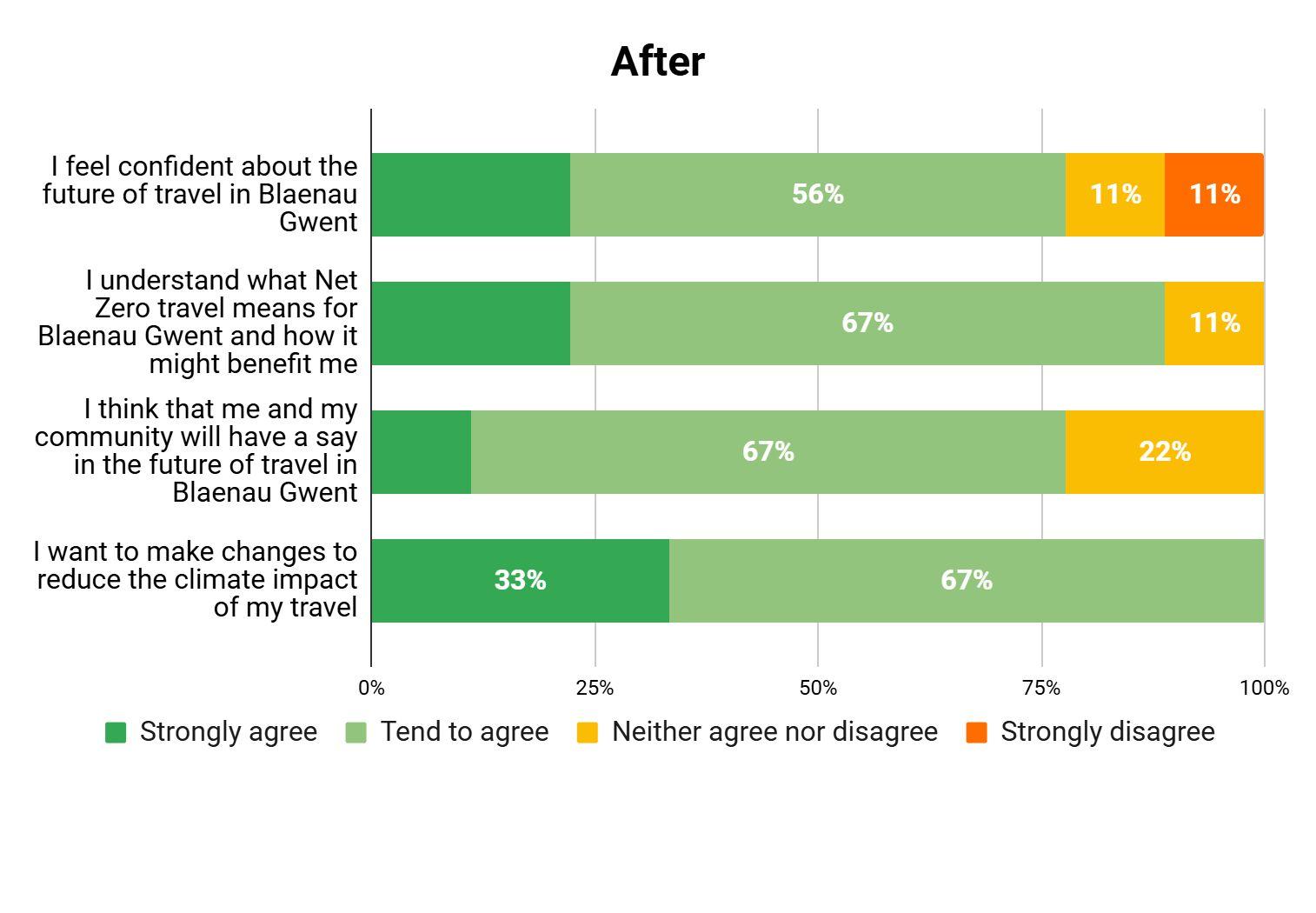




Appendix1: Commonand essentialjourneys

CommonandEssentialJourneys

Appendix2:How forummembers travel

Howforummemberstravel
At the second meeting, forum members were given cards with examples of modes of transport (eg. cycling, van, electric car) and asked to add to a table whether they used that mode ‘often’, ‘sometimes’ or ‘never’. Their answers are shown below.

Appendix3:Likes andDislikesabout TravelMethods
Dislikes/whywedon’ttraveltheseways
Cycling
Walking
Trains
● Hilly (steep)
● Don’t like it
● Use gym if want to exercise
● Cost
● Weather - especially in winter

● Impractical - if carrying shopping, if work in Cardiff / a long distance away
● Dangerous
● Busy roads while walking (especially with children)
● Overgrown hedges
● Weather
● Danger - poor lighting and fast cars
● Forced to use car to get to train station because of how far it is Note: this isn’t true for everyone
● Having to stand on the train to Cardiff when it’s very busy at midday on Saturdays
● Trains often cancelled and breaking down Note: not everyone agrees
● Bottlenecks in train network
● Limited train lines - in each Valley and across the top
● Cost (intercity)
● Delays
● Too hard to get the station
● Not guaranteed a seat
● Unreliable - doesn’t always turn up
● Timetable doesn’t join up
● Easier to drive and more flexible (driving goes from your door to exactly where you want to go)
● Costs adds up with family
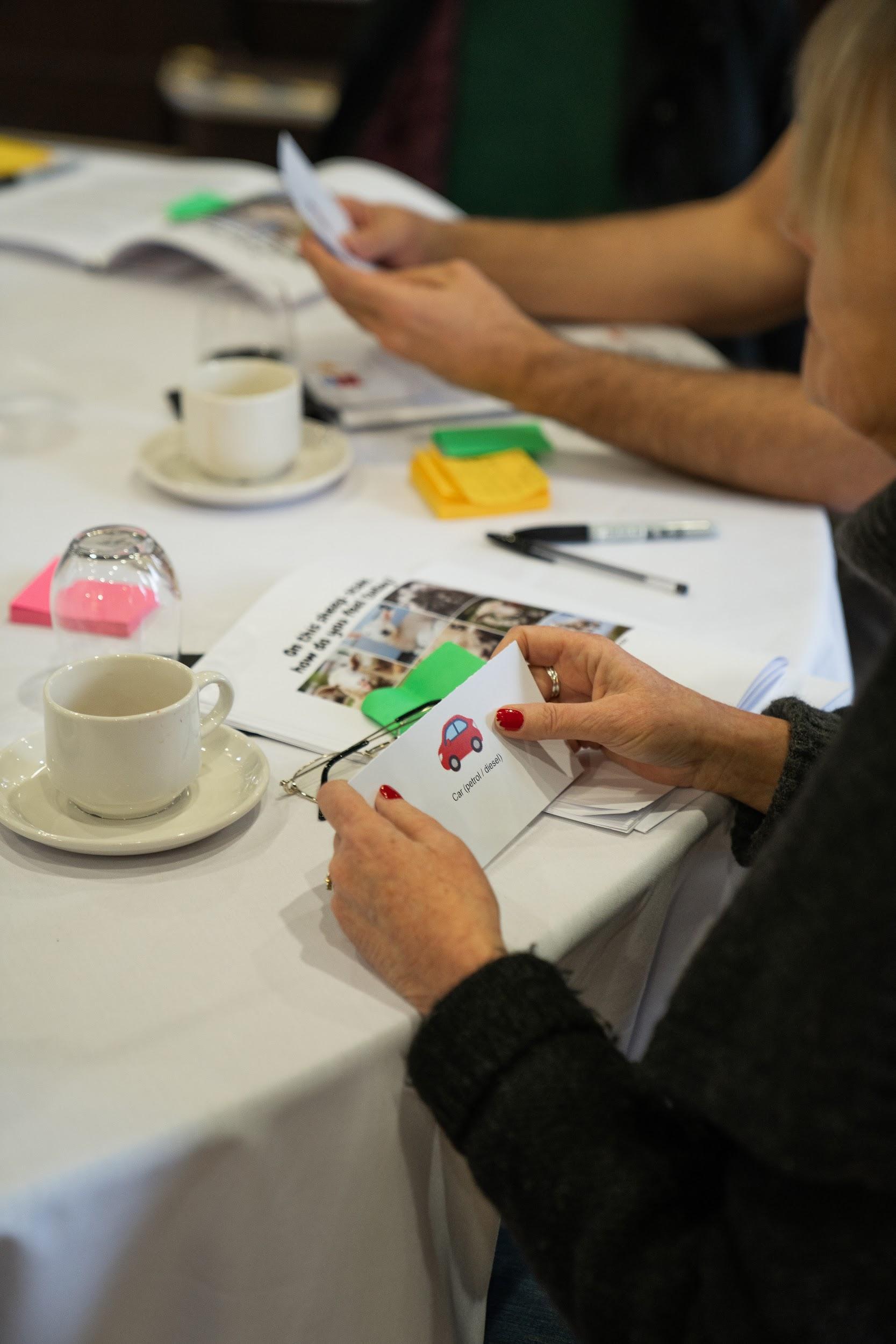

Dislikes/whywedon’ttraveltheseways
Buses
fflecsi bus
● Bus routes are not direct and take ages (e.g. it takes 1 hour 3/4 to get from Blaenau to Newport because the bus stops everywhere)
● Unclear / no bus timetables, which are difficult to read (including because they are bilingual)
● Poorly planned routes - limited bus coverage

● Bus service has no structure - bus routes are not integrated / interconnected
● Lots of services cancelled
● Bus changes with no consultation
● Crowding: almost always having to stand on the bus because it’s so crowded, and get on/off at stops to let people get in and out
● Rude bus drivers
● More bus depots needed
● Bus stops too often to let people off – e.g. every 200 meters. Most people could walk.
● Note: Some people disagreed with this point because they felt not everyone could walk the extra distance if the bus stopped less frequently.
● Didn’t turn up
● Timescales - the buses don’t link up, so you have to wait between buses which takes ages
● Bad past experiences, including of other bus users’ behaviour
● Who else gets the bus (e.g. people defecating on the bus)
● Dirty
● Time it gets compared to driving
● No guarantee of getting home again
● fflecsi bus is confusing and not available to all
● Reductions in fflecsi bus - limited space / availability
● App not user friendly


Dislikes/whywedon’ttraveltheseways
Cars and parking
Lack of information / awareness
Public transport tickets
Public transport in general, including accessibility
● Streets full of parked cars (including on junctions and outside driveways). They block emergency services and mean that delivery vehicles have to stop in the middle of the road which increases journey times because you have to wait for them to move.
● Difficulty parking on lots of streets, leading to going around in circles
● Lack of disabled parking

● Eco mode doesn’t work at less than 25mph, so 20mph is a problem
● Vans driving very fast down narrow roads damage cars
● Not enough incentive to transition to more efficient vehicles
● Housing infrastructure built 1900- 1970 doesn't support amount of cars or population size
● Personal vehicles are older in the valleys
● EVs too expensive
● A lot of people don’t know that a bus pass gets you a discount on trains to Cardiff
● Most people don’t know about the fflecsi bus or how it works
● Lack of communication and publication of what is there
● Lack of education about how to cycle
● Lack of education about how to drive alongside cyclists
● No discount if end up standing or sitting on the floor
● No integrated tickets on public transport
● Limited age range covered by youth bus pass
● Trains and buses not disability- or child- friendly because of having to stand
● Trains and buses not accessible to people with walkers etc because no space
● Tech barrier to people using public transport (e.g. tap and go on The Valleys)
● Not enough incentives to encourage people to take public transport
● No transport from South Wales to North Wales
● Private companies prioritise profit over people


Dislikes/whywedon’ttraveltheseways
Funicular ● Funicular in Ebbw Vale Is not open often enough
Roads
● Too many different speed limits within a short distance (e.g. one mile)
● Bottlenecks in road network

● Roads in disrepair / potholes (including causing damage to cars)
● Road repairs don’t seem to last long – maybe don’t do repairs in winter when water gets into them?
● Cost of resurfacing road when it’s not right first time (e.g. because drains are done wrong)
● Disruption from Head of the Valleys work
● Inconsistent 20mph speed limits can really bottleneck traffic
Taxis
● Irregular taxi fares - being charged different prices for the same journey, unpredictable
● Not as easy as using your own car
● Can’t guarantee being able to get home again (i.e. being able to find another taxi for the return journey)
● Don’t work past 7pm in some areas - you have to have a personal relationship with the driver to get one
● Can’t get one when needed, including in emergencies
Specific types of journey
● Contract buses for college cancelling at short notice -> education impacts
● Chaos around schools (people parking up an hour early, people driving when they could walk, no drop off point, schools located close together). Note: Some people need to drive because, for example, they have more than one child at different schools
● Lack of/ poor hospital transport (elderly)
● Overcrowding for events and bank holidays
● Mismatch with work patterns (irregular shifts) - impact on workers - extra cost
● While travel works well for leisure (e.g. getting to Newport), it doesn’t work for practical day-to-day activities locally.



Dislikes/whywedon’ttraveltheseways
Specific areas
General
● Tredegar: no train and a declining bus service, which means people have to use cars more
● Blaina: queues of traffic to shopping centre (e.g. up George Street) results in pollution, a lack of a safe place to cross for school children, and chaos at the roundabouts. Feels badly planned – why is the entrance to the shopping centre on this side not the other one?
● Can't get to places without a car (e.g. food shops) which makes it impossible not to have a car
● Delivery limited by: inconsistency, fact network not joined up, resource issues
● Poor accessibility
● Council has poor understanding of transport experience - they’ve never been on it and don’t know what it’s like
● Cost / affordability
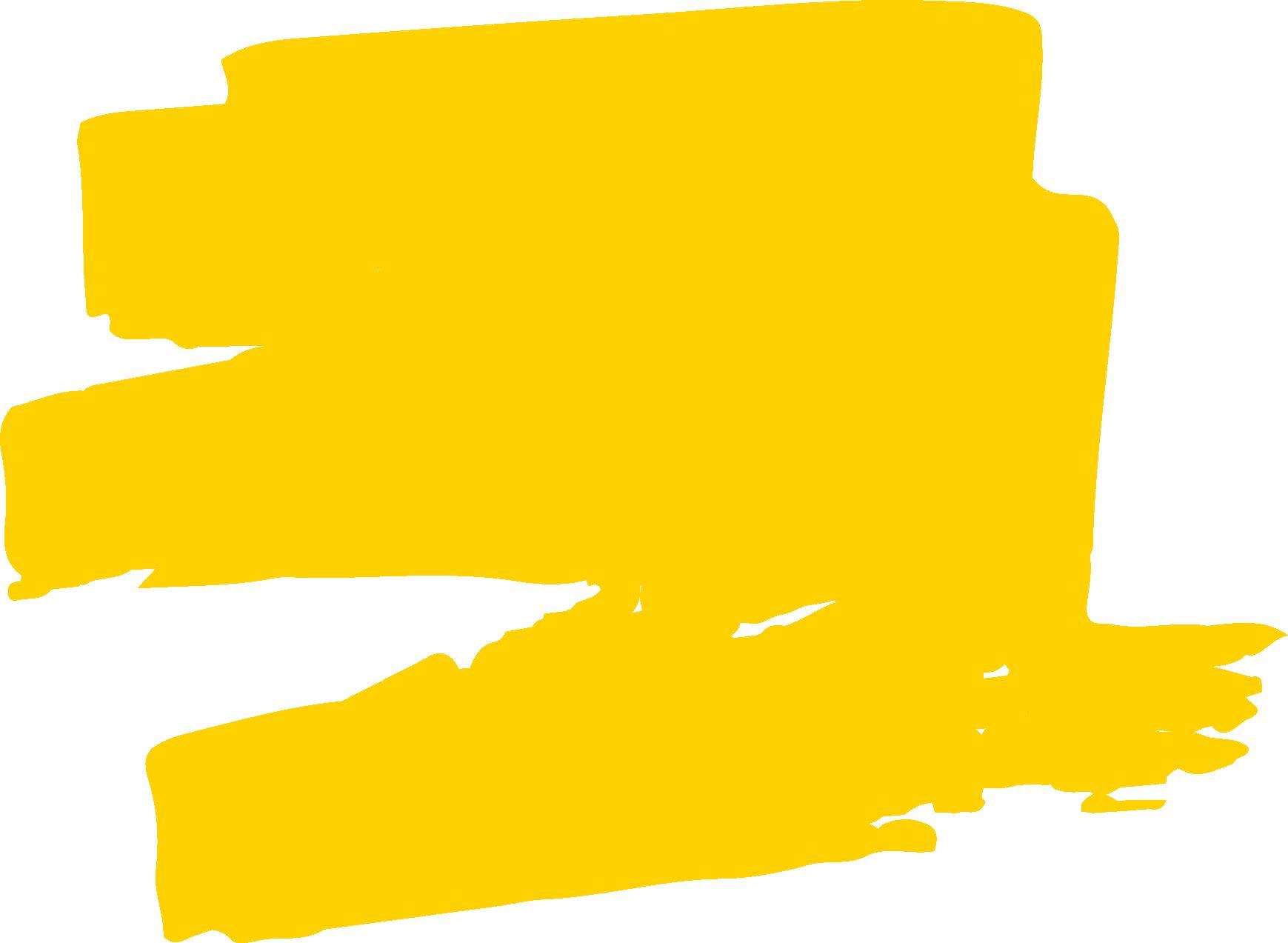
Likes/whywetraveltheseways

Cycling
Walking
Trains
Buses
● Cycle paths safer than roads
● Cycle paths nice for walking (no cars, relatively quick)
● More cycle paths now
● Cycle paths - Good range of routes throughout valleys
● Cycle paths are nice for walking - but are poorly maintained
● Ebikes: opportunity for more use; economic opportunity
● In summer can walk to school
● Good range of routes throughout valleys
● Smaller towns - everything is in walking distance (but not for everyone)
● Short walk to station Note: This isn’t true for everyone
● Train to Cardiff (easier and less stressful than driving)
● Train to Newport (new)
● Existing train connections
● Reliable Note: Not everyone agrees with this
● Free parking at most stations
● Frequency
● Train station options (but not for everyone)
● Better service now there’s two companies
● Stagecoach app (easy to plan journey and convenient)
● Good heating on bus
● Meet people on buses
● Comfort (but not everyone agrees)
● Convenience

Likes/whywetraveltheseways

fflecsi bus
Cars and parking
Taxis
Specific types of journey
● Flexible times
● Bespoke
● Cross between bus and taxi
● Regularity, but not enough (not everyone agrees)
● Good concept
● Having the option to book via the app or the phone
● Good concept
● If you have a car, everything is in quite close proximity
● Free parking, helps regeneration
● Lots of town centre parking
● Eco mode on cars
● Convenience
● Carpooling - fuel saving, maintenance
● Convenience
● Works well for leisure – e.g. getting to Merthyr, Newport
● Works well for people who work in Cardiff
● Holidays
● Medical
● Moving home
Coaches
● National Express / Mega Bus

Likes/whywetraveltheseways

Vans ● Convenience
● Car pooling
● Tool storage
Roads
Public transport tickets
● Great Road links to M4
● Completion of Heads of Valleys will improve car travel
● Main roads good quality
● Good road system
● Trains reasonably priced
● Trains – under 12s go free
● Senior bus pass (free)
● Bus pass for young people
● Can use bus pass to get discount on some trains
● Bus fares / fare cap
● Tap and go on Valleys Line reducing/ capping fares
General ● Good intentions published (the Council is saying the right things)
● Connects communities and friends
Question ● Will there be buses of the Heads of Valleys road? Will it improve public transport?


Appendix4:Initial Ideasfor Recommendations

1. Reducing car use for commutes
2. Better access to train stations to encourage greater train use
3. Dedicated / improved transport to the hospital
4. Improved transport options in the evening
5. Making it possible to walk to school, at least in good weather
6. Ensuring everyone can get to school, even in bad weather. Reducing car use for the school run
7. Helping people get to the shops
8. Helping people to get to communal places
9. Encouraging people who walk and/or cycle for leisure to walk and/or cycle for some purposeful journeys
10. Making buses feel like an option for people in their thirties and their lifestyles
11. Publicising existing community transport schemes better. people who need to use it know about it.
12. Better understanding demand for community transport and how to meet it
13. Increase capacity (seating) on the Fflesci service and increase funding for it
14. Changes to bus routes and services
15. Public ownership of buses
16. More electric buses
17. Better publicity for active travel
18. Encouraging cycling uptake
19. Improving infrastructure for cycling
20. Making an asset out of the “spinal” nature of transport in the valleys

21. Aim for ULEZ compliant cars until EVs are cheaper
22. Making sure Blaenau Gwent is ready for EVs
23. Exploring ways to increase car sharing (e.g. car clubs and car pools)
24. Exploring ways to accelerate the uptake of electric vehicles where Blaenau Gwent can (even if not everyone can afford them)
25. Test how to change attitudes towards car ownership to reduce the number of cars.
26. Ramp always there for wheelchair users to get on to trains. And people told that.
27. Better lighting on a465 and Ebbw Vale Morrisons Area (A4047)
28. Change champions and community to model educate and inform (eg Councillors, residents, businesses)
29. Better integrated planning of different highway infrastructure, with consultation of pedestrians (for example Brynmawr Asda)
30. Repair, reuse, recycle for bikes and cars
31. Encourage home delivery to avoid shopping trips
32. Regulate taxis
InitialIdeasforRecommendations
By the end of the second session, the forum had a long list of ideas for recommendations. Before the final session, these were compiled, themed and shared with the Advisory Group for review. The tables on the next pages show the initial ideas before they were selected, refined and developed.
Headline recommendation (and why)
What you’d like to see happen (suggestions so far)
Support for businesses to set up dedicated transport to large workplaces. For example, there is dedicated transport to the Amazon warehouse in Newport. There used to be transport to the pits and collieries and steel works.
1
Reducing car use for commutes
Encouraging employers to promote / facilitate car sharing
Council to look into carpooling organized through workplaces: are there examples of how this can work well? What could Blaenau Gwent council do to support it?
InitialIdeasforRecommendations
Headline recommendation (and why)
2 Better access to train stations to encourage greater train use
What you’d like to see happen (suggestions so far)
Dedicated, direct transport to stations, e.g. at commuting times Integrated timetables (e.g. so buses get you to the station on time for trains)
3 Dedicated / improved transport to the hospital
Volunteer drivers for community transport, focusing on hospitals 4
Improved transport options in the evening
You can’t get public transport to go out (e.g. for a drink), because there’s no guarantee you’ll be able to get a taxi home. Taxis are often unavailable, including in emergencies. Improved transport options in the evening would give people the option of leaving their car at home.
On-call taxi service Taxi rank at train station Metered taxis so that prices are guaranteed rather than variable
Extending bus / Fflesci bus services into evening (after 5pm to 10pm) across Blaenau Gwent
InitialIdeasforRecommendations
Headline recommendation (and why)
What you’d like to see happen (suggestions so far)
Making pavements wider
5
6
Making it possible to walk to school, at least in good weather
Cutting back overgrown hedges to make more space on pavements (there are some specific needs around Deighton school, for example).
Walking groups / Walking bus run by schools and volunteers
Integrated timetables (e.g. so buses get you to the station on time for trains)
Community transport for school-run for people who don't have cars
Ensuring everyone can get to school, even in bad weather
Reducing car use for the school run
School-run car share scheme / Schools organising carpools (where you share a car with someone else making the same journey) and carpool routes
Having school bus(es)
InitialIdeasforRecommendations
Encouraging people who walk and/or cycle for leisure to walk and/or cycle for some purposeful journeys Awareness raising about climate impacts
Incentivising people to leave the car at home - for example less car tax or council tax if you drive fewer miles. An MOT certificate tells you how many miles you’ve done.
11
Headline recommendation (and why) What you’d like to see happen (suggestions so far)
Press coverage - local, Wales online, local radio stations
Information desk at Ebbw Vale hospital and reception staff being trained in it
GPs telling people about it
Publicising existing community transport schemes better – both to increase the number of volunteers and to make sure people who need to use it know about it. Most of us didn’t know this existed, including some of us who know people who would be happy to volunteer.
Reaching out via social clubs (for example golf, pensioner clubs) – particularly ones that attract retired people who may have more time to volunteer
Going to clubs and events to speak (eg stall at classic car show)
Promote via community pages on social media
Flyer in a council letter
Advert at cinema before the films start – they do local ads
The Council to run a course for potential volunteers, like they run speed
awareness course
Having stands in the supermarket, like energy companies do
Publicity / stalls at the library
Publicity / stalls at community centres
Publicity / stalls / speaker at bingo
InitialIdeasforRecommendations
understanding demand for community transport and how to meet it Exploring what can be done through the Fflesci bus and what can be done through community transport.
Increase capacity (seating) on the Fflesci service and increase funding for it
Bus route on Heads of the Valleys to join up valleys across the top (circular, hop on, hop off) Sunday service for buses - seven day
Increase buses early morning / late night. Especially in industrial estates Bus routes to parks/ playground
InitialIdeasforRecommendations
InitialIdeasforRecommendations
Headline recommendation (and why)
18 Encouraging cycling uptake
19 Improving infrastructure for cycling
What you’d like to see happen (suggestions so far)
Cycling proficiency lessons for adults
Ebikes - subsidy to buy
Registration of bikes on the road - safety.
Cycle tracks could be helped by volunteers to be maintained.
Need to be safe.
Collaborate with colleges - include students doing construction and carpentry or Duke of Edinburgh
Or community service / probation
More cycle sheds for safe storage (e.g. at cinema)
Connect cycle sheds to routes
InitialIdeasforRecommendations
Headline recommendation (and why)
20 Making an asset out of the “spinal” nature of transport in the valleys
What you’d like to see happen (suggestions so far)
Formalise “spinal” routes as a policy. The valleys has a challenge about spinal routes: it’s hard to cross the valleys, and instead routes go straight to Cardiff or up to the Heads of Valleys. Can the Council turn that to its advantage in its planning and introduce a policy about lots of walking and cycling routes going into the spine to meet it at different points.
21 Aim for ULEZ compliant cars until EVs are cheaper
Aiming for ULEZ compliant cars not electric ones (short term while electric vehicles are expensive). We don’t want a ULEZ zone - we just think ULEZ compliant cars are a good standard to aim at for now.
Use of signs and education
22 Making sure Blaenau Gwent is ready for EVs
We don’t want Blaenau Gwent to be left behind other areas.
The Council should make sure the infrastructure is ready for EVs.
InitialIdeasforRecommendations
Headline recommendation (and why)
What you’d like to see happen (suggestions so far)
Scheme to reduce the expense to individual households of installing chargers
Blaenau Gwent to advocate for changing UK and Welsh government policy on electric vehicles (for tax and planning)
23
Exploring ways to accelerate the uptake of electric vehicles where Blaenau Gwent can (even if not everyone can afford them)
24 Test how to change attitudes towards car ownership to reduce the number of cars.
Exploring ways to financially incentivise EV uptake - e.g. providing some sort of financial incentive / rebate for people who invest in EVs
Lead by example, with the Council and public services (e.g. emergency services) switching to EVs where EV options exist.
InitialIdeasforRecommendations
Headline recommendation (and why)
What you’d like to see happen (suggestions so far)
Explore how car sharing could work in Blaenau Gwent. Any scheme would need to be well communicated.
Communicate existing car share opportunities, for example by putting information in with the annual community charge
25
Exploring ways to increase car sharing (e.g. car clubs and car pools)
App for car sharing, and other vehicles (e.g. vans) if possible
Blaenau Gwent to advocate for Welsh universities to look at car sharing (electric if possible)
Increasing awareness of TrydaNi - Can others join? - How do we find out? / Publicity 26
Ramp always there for wheelchair users to get on to trains. And people told that.
So people don’t have to book in advance, with the hassle and embarrassment that can cause.
lighting on a465 and Ebbw Vale Morrisons Area (A4047)
Change champions and community to model educate and inform (eg Councillors, residents, businesses)
Better integrated planning of different highway infrastructure, with consultation of pedestrians (for example Brynmawr Asda)
Repair, reuse, recycle for bikes and cars Ways to recycle and reuse bike and car parts (for example, Abergavenny bikes or Llanbradach Valleys Recreation Centre)

Appendix5: Fairness Guidelines
FairnessGuidelines
FairtravelinBlaenauGwentmeans…
Idea 1: Fair travel in Blaenau Gwent means everybody being able to access transport in general, and public transport in particular.
Because equality for all is important.
This includes:
● Transport being affordable. For example, pricing on public transport that is structured so it is affordable for all; not passing on the cost of switching to electric buses to people through higher fares; not assuming that people in their 30s to 50s can always bear the brunt of costs and changes.
● Transport being near enough for everyone to access, including older people.

● Making sure not everything is digital, because digital is not accessible to everyone.
● Making walking routes more accessible (e.g. flatter and better surfaces). At the moment it’s hard for those with wheelchairs, buggies, and/or mobility issues to move about if pavements are in disrepair.
● Making public transport more accessible for people with mobility issues, without making it a hassle or embarrassing for them (e.g. by having to request special ramps in advance). For example, there are currently big steps and a lack of lifts for trains and buses.
FairnessGuidelines
FairtravelinBlaenauGwentmeans…
Idea 2:
Fair travel in Blaenau Gwent means not cutting climate changing emissions from transport as quickly as possible, if it means some people missing out on being able to access transport.

There may be options for some people to do more to tackle emissions, but it has to be for the benefit of all and should not be at the expense of giving everyone access to transport.
Because
• Everyone should have the opportunity to access transport
• Everyone has to come on the journey together; if you leave some people behind you will end up with a divided community.
FairnessGuidelines
FairtravelinBlaenauGwentmeans…

Fair travel in Blaenau Gwent means meeting people’s different needs.
Because people have different needs, so you need to treat people differently to be fair (equity not equality).
Fair travel in Blaenau Gwent means being non-discriminatory
Because no one should face discrimination and everyone should be treated with respect.
FairnessGuidelines
FairtravelinBlaenauGwentmeans…
Idea 5:
Fair travel in Blaenau Gwent means avoiding foreseeable unintended consequences and excluding people by mistake, and minimising them when they do happen.
Because
• It’s important not to go from one extreme to another (e.g. all offline to all digital); instead you need to balance different needs.

• You should design every system to include as many people as possible (e.g. having the option of an oyster card or pre-pay card, not just a credit card).
This includes, for example:
• Considering questions / areas like:
• Would enforcing a switch to electric buses cause a bus company to pull out of the area, which would have a big negative impact?
• Would people walking more may lead to bus services being scrapped?
• Digital exclusion
• Requiring a debit card which some (refugees) don't have
FairnessGuidelines
FairtravelinBlaenauGwentmeans…
Idea 6:
Fair travel in Blaenau Gwent means investment in public transport and active travel should be the priority so that it’s easier for everyone to use (even if they have a car).
Because if you give people a real choice (public transport and active travel that is efficient and affordable) then you can make the biggest difference by changing people’s behaviour towards more sustainable transport use.
Idea 7:

Fair travel in Blaenau Gwent means encouraging local businesses and making sure transport links to them
Because if there were more local businesses, people wouldn’t have to travel as far. Local businesses also need transport links to support them.
FairnessGuidelines
FairtravelinBlaenauGwentmeans…
Idea 8:
Fair travel in Blaenau Gwent means targeting support (not services*) at where there is greatest need and/or the greatest ripple effect of impact
Because
• Providing support to those who most need it is important;
• It relieves pressure on those already supporting those most in need;
• It helps multiple groups and is cost and time effective.

This includes, for example: targeting youth, as it ends up benefiting parents and all of society.
*Services should serve everyone, but additional support should be targeted at those who need it in order to access the services (an equity approach). The exceptions to this are services where the whole service is aimed at a specific group (for example, community services, or school buses).
FairnessGuidelines
FairtravelinBlaenauGwentmeans…
Idea 9:
Fair travel in Blaenau Gwent means being transparent about how and why support is targeted at different groups.
Because It’s important that:
• People don’t feel left out when others receive support;
• People understand each others’ situation and why support is needed;
• To show that support is based on need not favoritism (this is about education and awareness).
Idea 10:

Fair travel in Blaenau Gwent means not just looking at transport, but also looking at technologies, people, and processes as enablers of transport.
Because transport is complicated with a lot of different aspects to it. You need to understand all of them in order to make transport greener, better and fairer.
FairnessGuidelines
FairtravelinBlaenauGwentmeans…
Idea 11:
Fair travel in Blaenau Gwent means only asking people to do what they are able to, as long as it is safe
Because it is discriminatory to ask people to do things that they can’t, because it might make them feel inadequate.
This includes, for example: some people who walk for leisure but don’t think about walking for other journeys may be happy to walk more. But others (e.g. those with children) might not be able to do this.
It is fair to ask someone who is able to to walk, but it is only fair if it is safe (e.g. there are pavements and good street lighting). As it is, everyone has to wear a head torch.
Idea 12:

Fair travel in Blaenau Gwent means it is not fair to ask everyone to make changes all the time, but you could ask most people to make one small change.
This would only be fair if you helped them to identify what this change was. For example, avoiding single purpose journeys.
FairnessGuidelines
FairtravelinBlaenauGwentmeans…
Idea 13:
Fair travel in Blaenau Gwent means people who can comfortably afford to should be encouraged to contribute more. However, it is not fair to assume that working age people can afford to contribute more.
Because some people/businesses are wealthier and can afford to contribute more.
Idea 14:
Fair travel in Blaenau Gwent means companies doing their bit

Because it’s not fair to ask people to change if companies don’t.
This includes, for example: for example, Network Rail should electrify the railway line they own.

Appendix6:Votes for Recommendations

Levelofsupportfor recommendations
After writing the recommendations, forum members were asked to vote for their opinions of the recommendationsthat they “Love it”, “Like it”, can “Live with it”, or “Loathe it”.
The scores of this vote are tallied in the table to the right. The total score in the right column is the total of all the votes scores, with Loathe it being -1 point and Love it +3 points. They voted in the room at the final session on mentimeter. All votes were anonymous.

Annex1:youth forum
TheYouthForum

On 25 March, the local youth forum and students from Coleg Gwent met to discuss the forum’s recommendations and share some thoughts of their own. There were 11 young people in attendance, as well as a member of the citizens’ forum to hear their views and report them back to the forum.
““Excellent - always has things that need improvement - what you already have is a great stepping stone”
The group started by sharing some of their experiences of travel in the local area. Then they heard about the forum’s work and looked at some of the recommendations that are most relevant to young people. Finally, they shared their thoughts about how young people should have a say about decisions about local travel in the future.
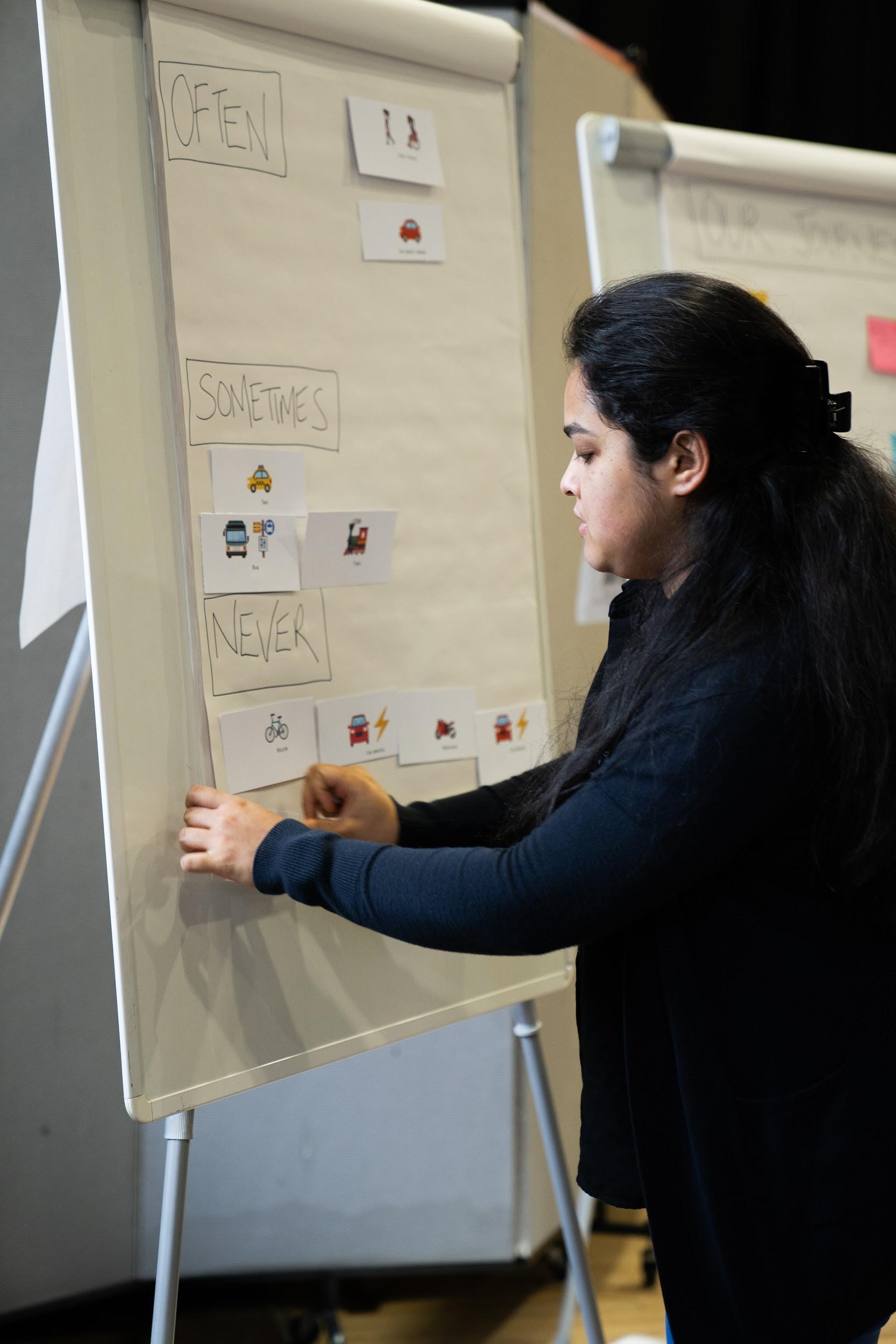

The next few slides contain a summary of their views.
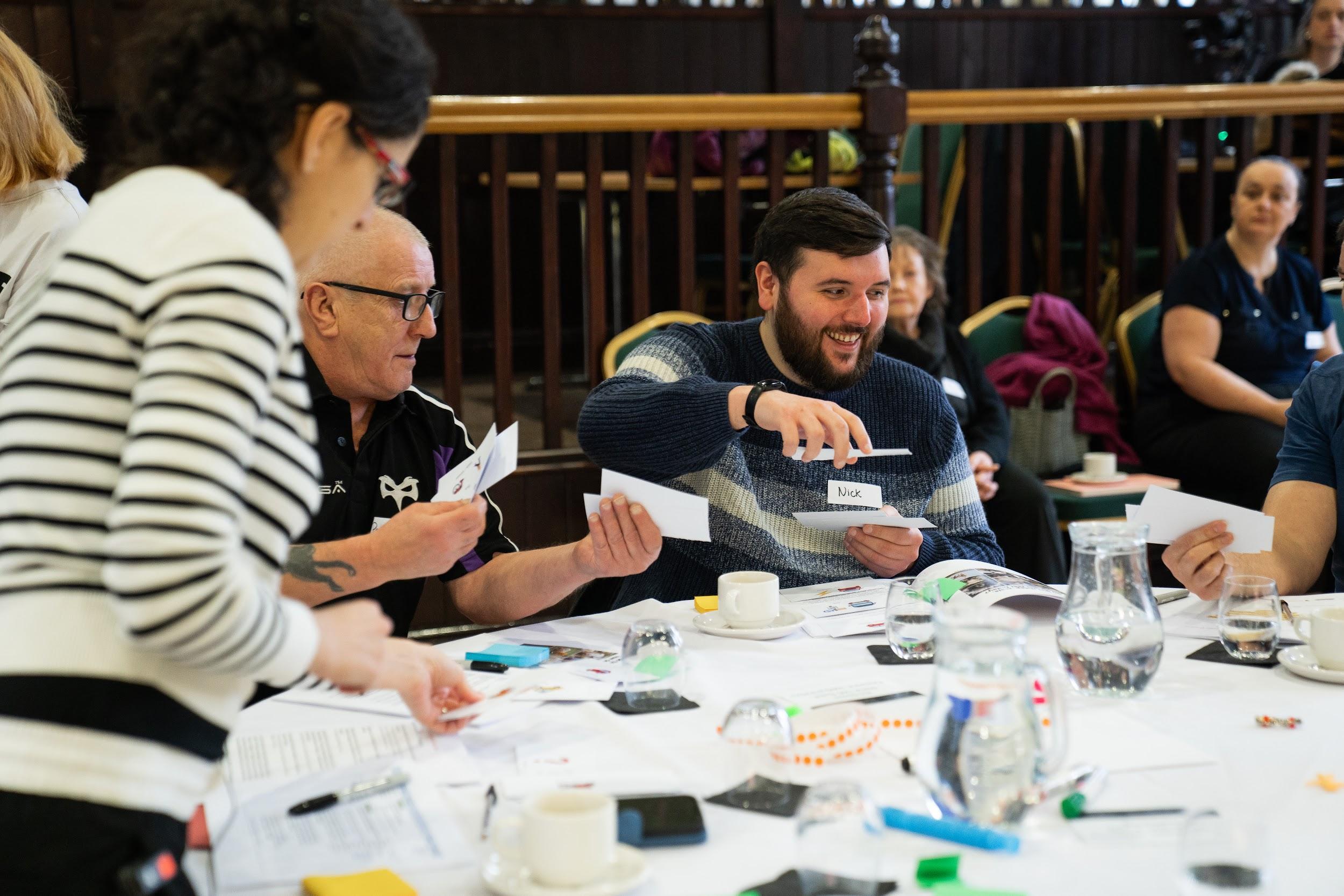
ExperiencesofTravel

The group shared some of their own experiences of travel in the local area, including what isn’t working at the moment. These are summarised below.

● Most issues related to buses and public transport being difficult to use. They shared that the bus services are getting worse.
● this included it being expensive, particularly for young people with income from part-time jobs. They suggested having a discount travel card for people in further education similar to those for university students.
● One person said that the Fflecsi bus was often fully booked. The group also mentioned how buses are overcrowded, particularly at the start of college in September.
● Different bus services (eg. 26, X2, 56) are often late or cancelled. This meant they had missed bus connections and/or been late for college. The timetable is also not early enough for some travel.
● Buses are not accessible to wheelchair users, one user said the because of a curb that is too high they cannot independently get onboard. Instead they pay £22/day to get a taxi to college themselves, as their travel funding was cut.
● Buses have driven past people, including when there are seats onboard.
● One person said it was easier to walk 45 minutes than take the bus. Another shared that for some places there is no safe alternative to a bus or car (eg. between Cwm and Abertillery).
Viewsonthecitizenforum’srecommendations

The group looked at six of the forum’s recommendations that they were most interested in. Their views on each of these are summarised below.
Active Travel
They agreed with having more paths, and some said that the educational initiative was a good idea. The youth forum emphasised having safe bike paths and secure bike parking, as these were a barrier to active travel. They said that it will have to work besides other ideas because not everyone will be able to walk or cycle”. Some examples included that it is not accessible to people with mobility issues, that some routes take significantly longer to walk or cycle, and that some journeys have no way to walk or cycle there.
Community transport
They had suggestions around safety to make sure people felt comfortable using it. Including, vetting volunteers, additional safety measures for under 18s, using dashcams, and filters for women drivers. It was important to have multiple accessible vehicles so that everyone can use the community transport.

Reduce car commutes
One suggestion is to have a dedicated bus lane to incentivise people to use the bus.
Viewsonthecitizenforum’srecommendations(continued)
Improve transport options in the evening

That there should be consequences for the bus companies for cancellations, such as reclaiming money from getting a taxi.
They also suggested having travel options for the nighttime, for example a bus route between Ebbw Vale and Tredegar, and Fflecsi buses.
Better options for school journeys
They said that having a school bus would be beneficial for all students to equally be able to travel. The free buses and school buses have stopped in recent years. Currently, having college students on the bus means it’s too busy for other commuters.
Educational institutions could gather information on the number of students travelling and when to help plan buses and bike schemes.
They identified some barriers to the cycling bus were if there would be council funding and that not everyone can ride a bike.
Fflecsi bus
There were some hesitations raised, including that the council should prioritise funding. There was a suggestion for the council to explore why buses are lacking capacity. Additionally, they suggested the bus could cover more areas (eg. Tredegar), and accept student bus passes.

Howyoungpeopleshouldhaveasayinthefuture

Finally, the group discussed how young people should have a say on decisions about local travel in the future. Their views are summarised below.

“The council don’t listen to people with disabilities and this needs to change. My personal experience is that the council hasn’t listened to me because they think that we are incapable of speaking up for ourselves, which I don’t think is true.”
“(It’s) disappointing when nothing ever changes. If we can see improvements, we may be more engaged”
● They would to directly provide feedback to bus service providers in a meeting
● The council should listen more to people with disabilities, for example by councillors holding meetings with disabled people.
● Schools and colleges are the best way to connect with young people is through schools and colleges. The council could develop relationships with college, schools and student unions.
● Council officers could go into schools and colleges to share information. Also for college and school trips to the council, with interactive sessions to give their views.
● To connect with young people online. The council account is corporate, and social media could be more tailored to young people to be more engaging. They also suggested more formats for information
● To involve young people from the beginning, provide feedback on consultations that have happened and show where there are improvements

Annex2:Followup session
Followupsession

After the final forum session, we invited forum members back for a follow up session to discuss the first steps that should be taken on some of their recommendations, and what the best ways of communicating them with other community members.
The forum members focussed on three of their recommendations that would require the wider community to change their attitudes or behaviour. Theses were:
● Promote and expand community transport schemes
● Provide better options for school journeys
● Encourage people to walk, cycle or wheel
They worked with council officers and local partners to come up with a high impact next step for each of these recommendations. These are based on what is achievable and on existing council schemes and resources. This means that they are things the council can deliver in the short term.
They then discussed how to talk about these recommendations to the rest of the community. They came up with some ideas for messaging around each recommendation, and voted on which of these messages they thought would be most likely to persuade community members to change their attitudes and behaviour. Their thoughts and ideas for each of these three recommendations can be found on the following slides.

Promoteandexpand communitytransport
schemes
High impact next step
Broaden existing council funding for community transport; to include community and wellbeing activities.
Messaging (number of votes in brackets):
● Reduces stress of getting to appointments on time (5)
● Helps people stay independent (4)
● Helps health and wellbeing - it is essential for isolated people (1)
● You get a personal and supportive driver (1)
● It enables you to check up on the vulnerable or alone - keep them safe (1)
● Eases pressure on services like health (0)
● There are checks on and support for drivers (0)
● It reduces environmental impact and reduce single journeys (0)
● It provides a cheap door to door service (0)
● It feels good to volunteer / help other people (0)
● Stress the social aspect - meeting new people and friends (0)
● The time commitment is flexible (0)
● You can build Intergenerational relationships (young and old) (0)

Messaging (number of votes in brackets):
● Show how it promotes better health (3)
Providebetteroptions forschooljourneys
High impact next step
Piggy back off the existing Walk or Wheel scheme with the walking bus. Use the road safety officers to help plan and make sure it is safe and highlight risks.
Secondary schools and post 16s should host meetings so that carpooling can be organised with comprehensive safety checks eg DBS, license checks, and valid insurance. Students and parents can see who they feel comfortable and safe carpooling with.
● Promote options for sharing the school run with other parents, eg Walking bus (3)
● Stress that it will reduce parking by schools - safer; keeps roads clear (2)
● Provide incentives for children, making it a game that is reward based, or an inter-school league
● (2)
● Too many children lack essential exercise. Walking to school can be a starting point (2)
● Start with the kids / youth as they are easier to influence and in turn they influence parents. It is the parents that then change how kids get to school.
● Provide safety and maintenance for cycles etc
● Provide information and support for parents and families
● Cone off school areas from car / parking
● Provide drying facilities in schools.
● Make clear there is no pressure to walk or cycle when in is wet or cold
● Stress how its a fun and voluntary way to travel (no expectation) to make it a permanent way of traveling
● Stress how it can exponentially improve children’s confidence and independence.

Encourage
people
to walk,cycleorwheel
High impact next step
Appoint and empower a single, senior, active travel officer with centralised power. They can then force through changes in culture, resources and activities. They should work in tandem with a dedicated appointed active travel councillor / cabinet officer. This will unlock all the above.
Messaging (number of votes in brackets):
● Promote as active travel as the alternative to car for some trips (4)
● Show how it leads to healthy lifestyles (2)
● Tell people the benefits of active travel (2)
● Stress the impact of active travel on mental health (1)
● Communicate info about the truth of net zero - there is a lot of disbelief out there (1)
● Create more safe and accessible cycle paths and walking areas (1)
● Publicise routes and info about the time it takes (1)
● Share information and advice on equipment, safety and maintenance support (0)
● Show examples of walking, cycling and wheeling successes (0)
● Get people to talk about their experiences (0)

Seize the opportunity to use council assets and cut the grass
● Publish statistics (number of paths cleared, length of paths, ‘suggested routes’) (0)
Also at the follow up session, they also discussed ideas for how to share these messageswhat channels the council should use to reach as many community members as possible. There are ideas on this slide.

● Media and press
● Local radio (in Bryn Mawr and Ebbw Vale)
● Physical newsletter, that is quarterly through every door, and which contains all transport options
● Local businesses
● Council forum
● Social media (facebook, discord, instagram, tiktok, linked in, youtube)
● The council website
● Leaflets and posters in prominent places (doctors’ surgeries, libraries, social clubs, bus stations, shops, cafes, colleges, leisure centres, schools, job centres).
● School channels (such as WhatsApp groups and the school newsletters)
● Opt-in emails and texts with weekly updates on travel options and new initiatives
● Sharing travel options with community leaders (like librarians, headteachers)
● Using coloured envelopes for post
● Visits and talks to existing groups (youth, sport, parents)
● Pop up stalls in town centres and events like fun days
● Strava and fitbit, apple fitness

